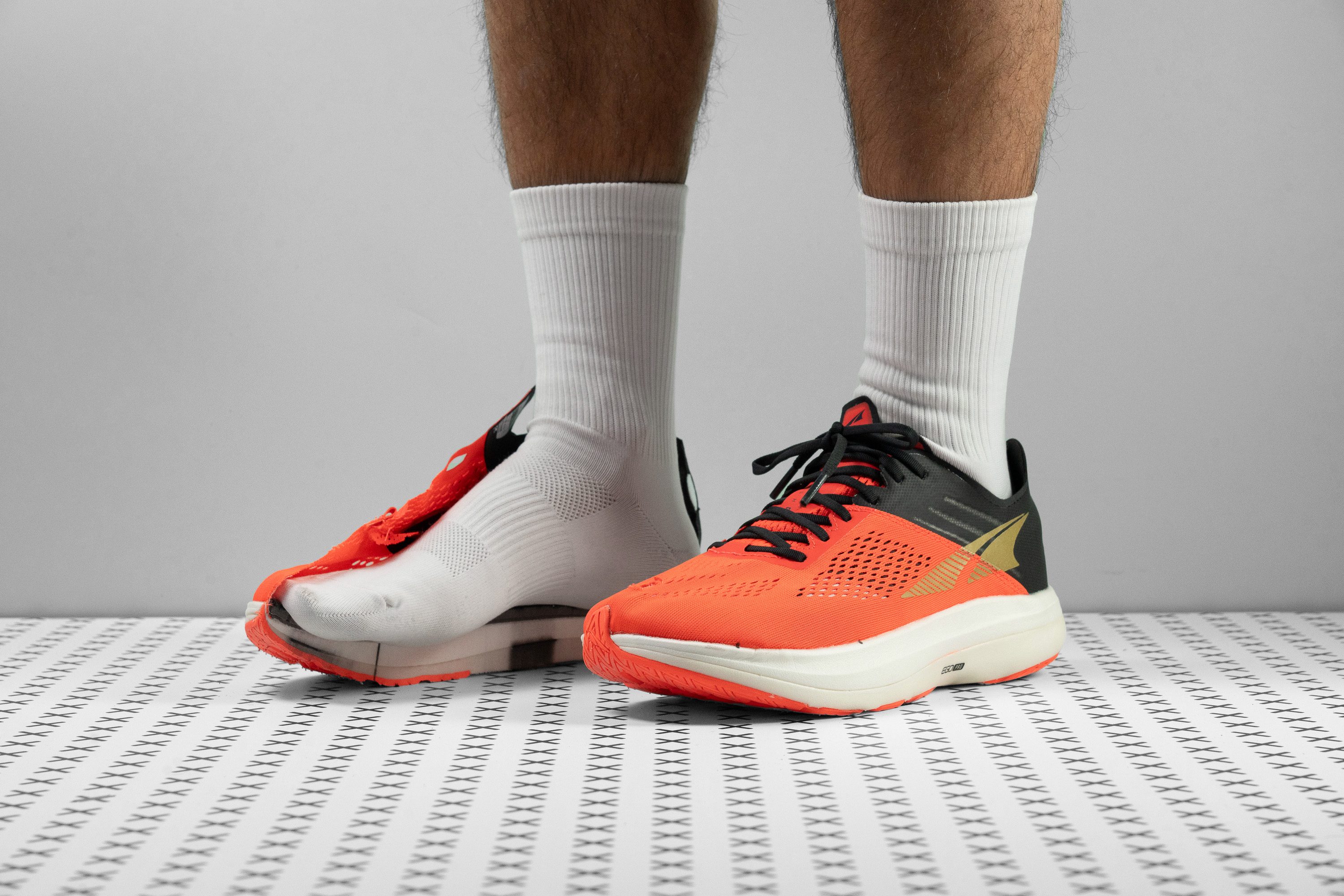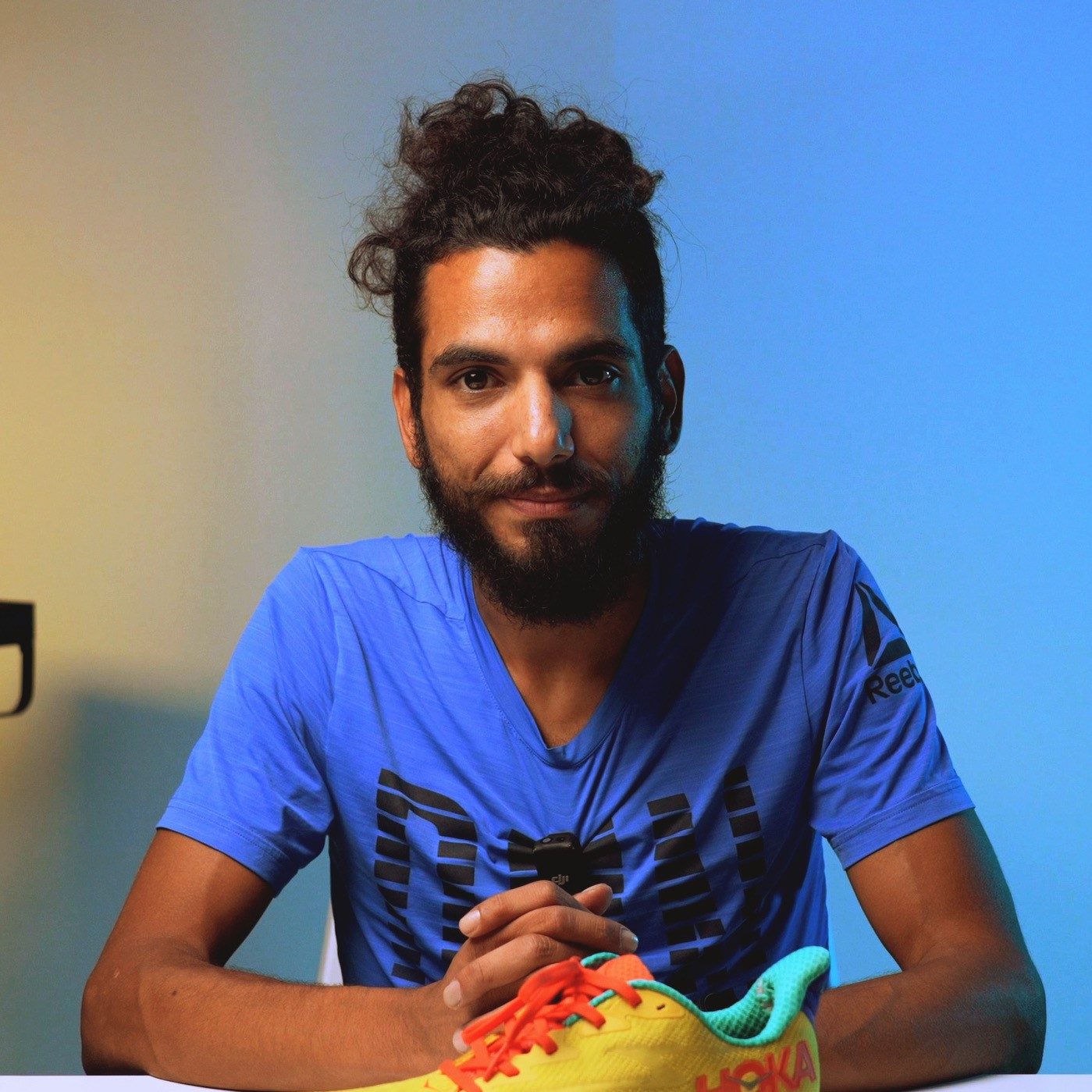Our verdict
Pros
- Runs fast
- Smooth heel-to-toe transitions
- Lots of protective foam underfoot
- Feels responsive
- Propulsive toe rocker
- Relatively lightweight
- Stable during sharp turns
- Lockdown fit
- Roomy toe box
- Accommodates wide feet
- Breathable on hot days
Cons
- Expensive
- Outsole is extremely flimsy
- Could be lighter for a super shoe
- Somewhat firm cushioning
- Laces don't stay tied
Audience verdict
Comparison
The most similar running shoes compared
+ + Add a shoe | |||||
|---|---|---|---|---|---|
| Audience score | 83 Good! | 90 Superb! | 81 Good! | 92 Superb! | |
| Price | £220 | £220 | £180 | £260 | |
| Pace | Competition | CompetitionTempo | CompetitionTempo | Competition | |
| Shock absorption | - | - | High | - | |
| Energy return | - | - | High | - | |
| Traction | - | - | Moderate | - | |
| Arch support | Neutral | Neutral | Neutral | Neutral | |
| Weight lab Weight brand | 7.8 oz / 221g 7.2 oz / 204g | 7.4 oz / 210g 8.1 oz / 229g | 7.1 oz / 200g 7.4 oz / 209g | 7.3 oz / 208g 7.4 oz / 210g | |
| Lightweight | ✓ | ✓ | ✓ | ✓ | |
| Drop lab Drop brand | 5.4 mm 0.0 mm | 3.7 mm 0.0 mm | 7.5 mm 8.0 mm | 8.1 mm 8.0 mm | |
| Strike pattern | Mid/forefoot | Mid/forefoot | Mid/forefoot | HeelMid/forefoot | |
| Size | Slightly small | Half size small | Half size small | True to size | |
| Midsole softness | Balanced | Balanced | Soft | Firm | |
| Difference in midsole softness in cold | Small | Small | Normal | Small | |
| Toebox durability | Bad | Bad | Decent | - | |
| Heel padding durability | Good | Good | Decent | - | |
| Outsole durability | Bad | Decent | Good | - | |
| Breathability | Breathable | Breathable | Breathable | Breathable | |
| Width / fit | Narrow | Medium | Medium | Narrow | |
| Toebox width | Wide | Wide | Medium | - | |
| Stiffness | Stiff | Stiff | Stiff | Stiff | |
| Torsional rigidity | Stiff | Stiff | Stiff | Stiff | |
| Heel counter stiffness | Flexible | Flexible | Flexible | Flexible | |
| Plate | Carbon plate | Carbon plate | Carbon plate | Carbon plate | |
| Rocker | ✗ | ✓ | ✗ | ✓ | |
| Heel lab Heel brand | 33.7 mm 33.0 mm | 33.1 mm 36.0 mm | 32.9 mm 35.0 mm | 33.3 mm 39.0 mm | |
| Forefoot lab Forefoot brand | 28.3 mm 33.0 mm | 29.4 mm 36.0 mm | 25.4 mm 27.0 mm | 25.2 mm 31.0 mm | |
| Widths available | Normal | Normal | NormalWide | NormalWide | |
| Orthotic friendly | ✓ | ✓ | ✓ | ✗ | |
| Season | SummerAll seasons | SummerAll seasons | SummerAll seasons | SummerAll seasons | |
| Removable insole | ✓ | ✓ | ✓ | ✗ | |
| Ranking | #504 Bottom 26% | #67 Top 18% | #301 Bottom 21% | #18 Top 5% | |
| Popularity | #472 Bottom 30% | #208 Bottom 45% | #139 Top 37% | #199 Bottom 48% |
Who should buy
We recommend this speed demon of a shoe as a great choice for:
- Altra aficionados looking to add the brand's first super shoe to their running rotation
- Midfoot/forefoot strikers in the market for a carbon-plated, race-ready shoe that's comfy and protective enough for 5K to marathon distances
- Runners who prefer lots of traction from their tempo trainers for a stable ride that feels incredibly efficient on turns and corners.
- Broad-footed runners in need of a snug-fitting toebox that isn't too constrictive on the toes for race day
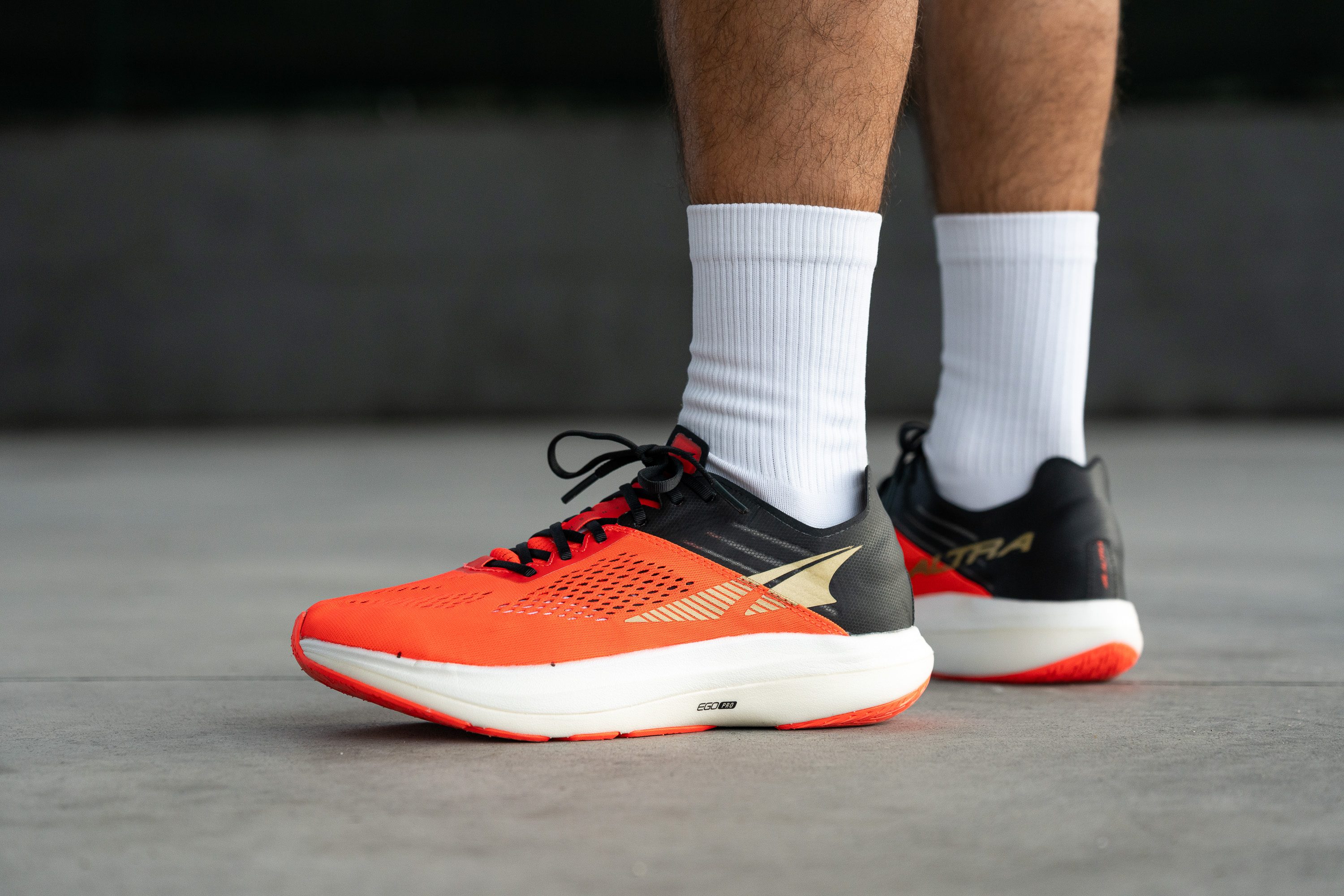
Who should NOT buy
Our heel felt suspiciously higher than the forefoot when we first put the shoe on. This suspicion was borne out by our stack measurements in the lab which put the Vanish Carbon in the category of mid-drop shoes. This means that zero-drop absolutists still, technically, don't have a super shoe to toe the starting line, but will be better served by something like the ASICS Metaspeed Sky+ which is closer to the mark with a heel drop of 2.7 mm.
The Vanish Carbon's Ego Pro midsole foam delivers great energy return but is definitely on the firm side of the spectrum. Runners who prefer a more plush ride from their race day shoes should consider the Nike ZoomX Streakfly instead.
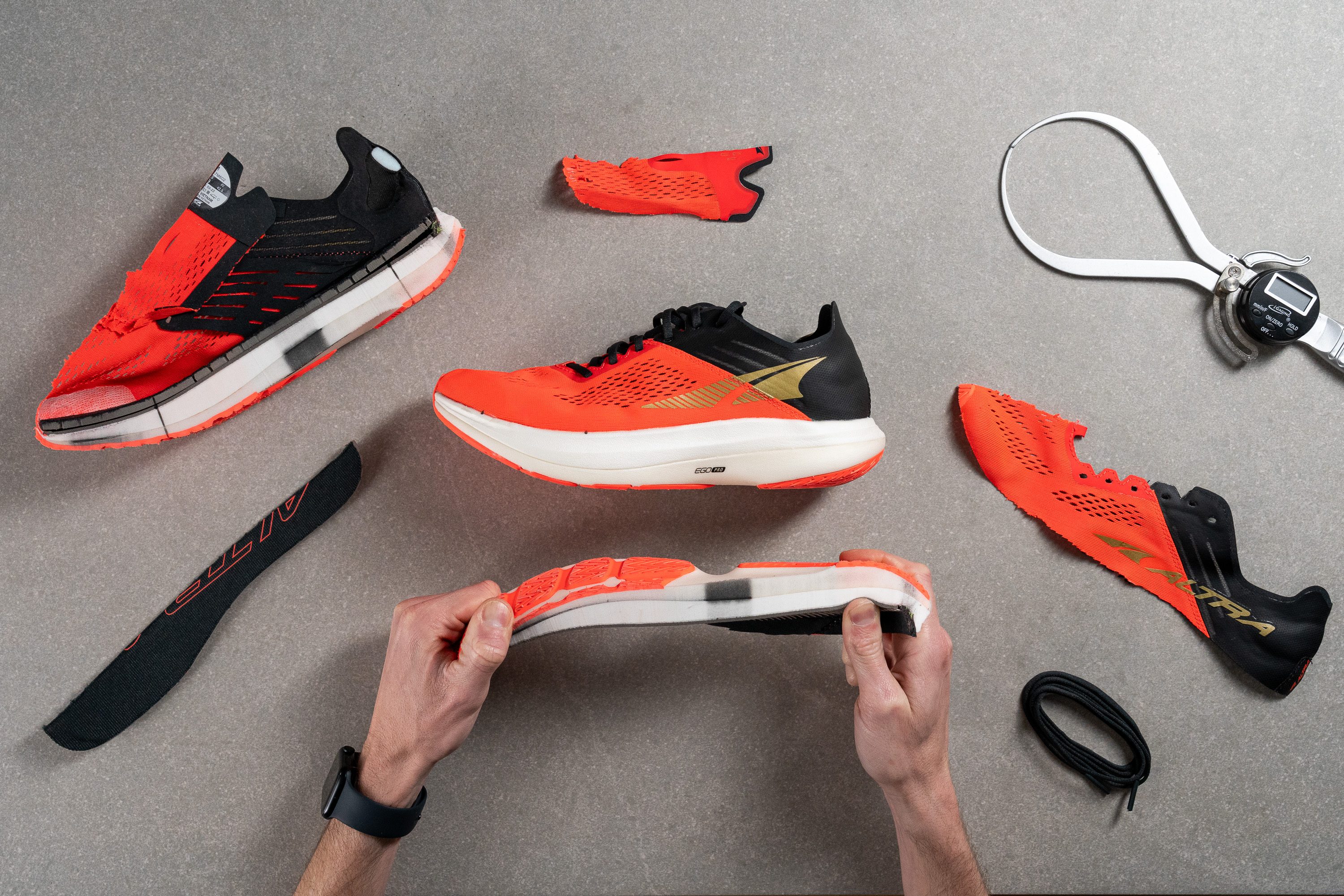
The Vanish Carbon is quite light, but there are much lighter race-day alternatives out there like the Saucony Endorphin Pro 3 which boasts a similar stack and retails for around the same price.
The shoe's EVA outsole is lightweight and extremely grippy but lets the Vanish Carbon down in terms of durability by performing miserably in our Dremel test. We, therefore, recommend saving this shoe for race day while using a shoe with a hardier outsole as a tempo trainer, like the Hoka Rocket X 2.
Cushioning
Heel stack
Using our calliper, we measured the Vanish Carbon's heel stack to be 33.7 mm thick, making Altra's spec height of 33 mm very accurate. However, we won't get ahead of ourselves and congratulate them on that just yet.
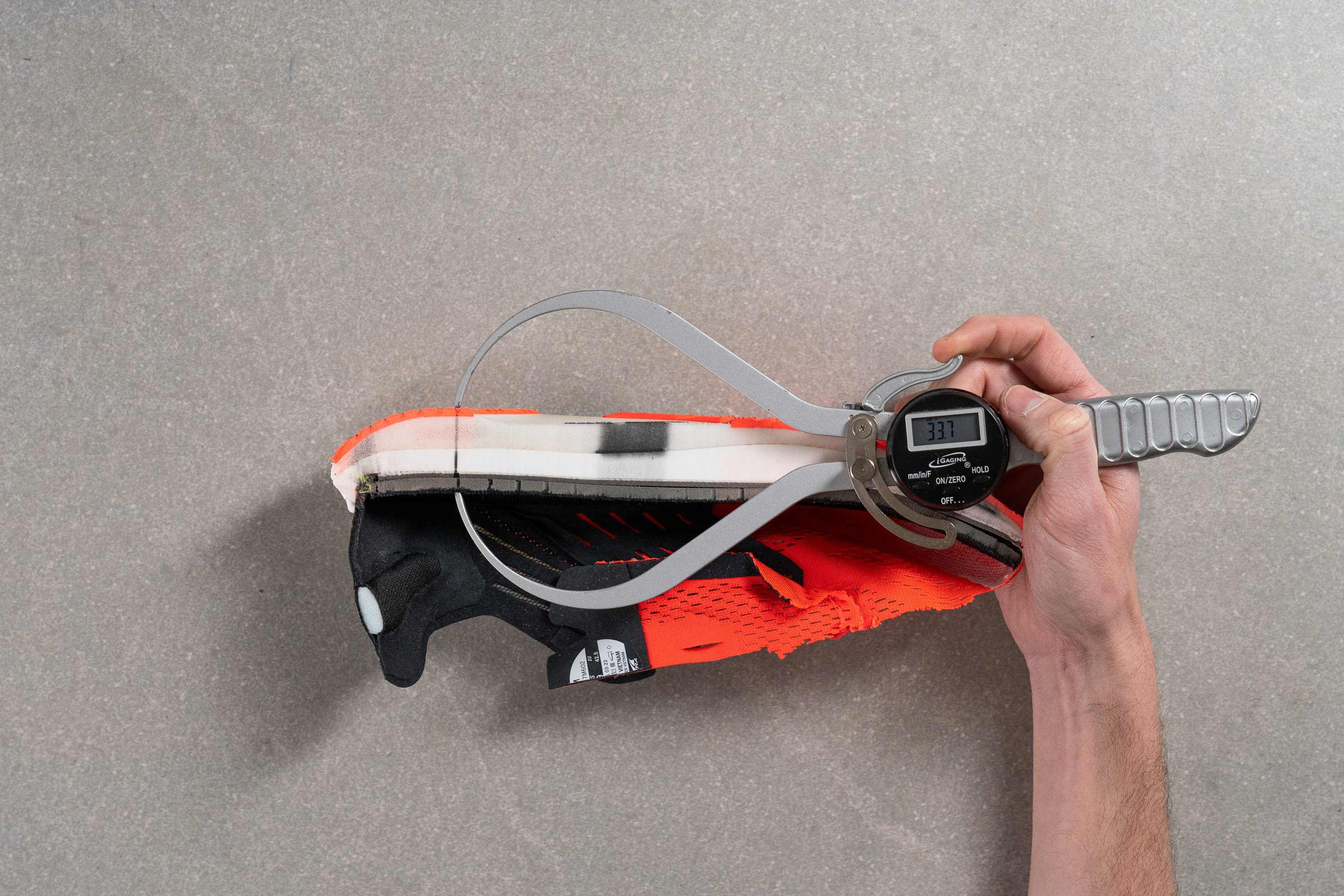
This is right around our current lab average and, despite this shoe being more suited to midfoot/forefoot strikers, is a healthy amount of foam to dampen our landings in the event of heel striking in this shoe.
| Vanish Carbon | 33.7 mm |
| Average | 34.8 mm |
Forefoot stack
Naturally, we expected the forefoot stack to match the heel but there's a plot twist with the Vanish Carbon. However, according to our calliper measurements, it's significantly lower than that at 28.3 mm thick. This is still an above-average amount of foam which did a good job of dampening the harsh landings of our high-paced tests.
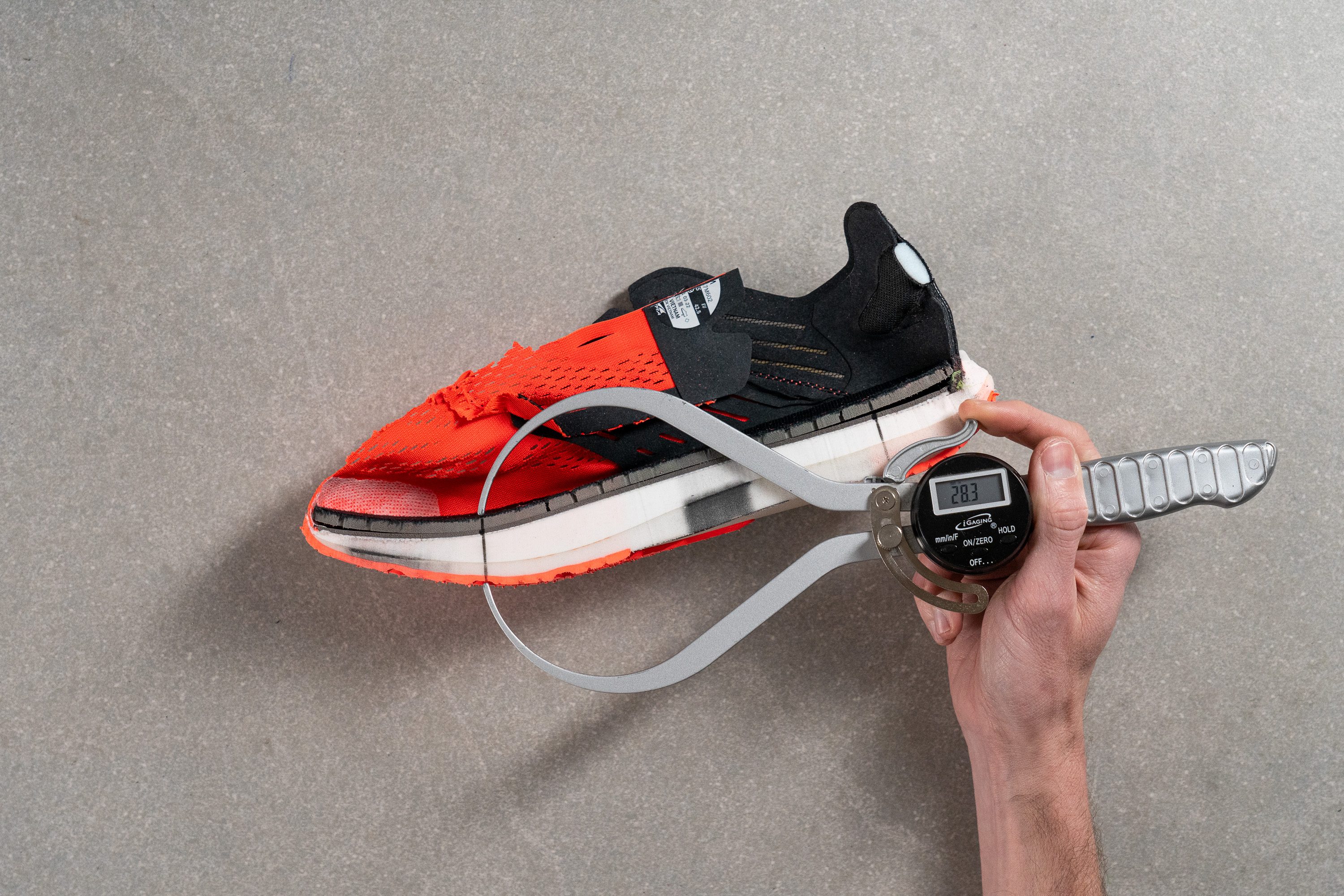
| Vanish Carbon | 28.3 mm |
| Average | 26.2 mm |
Drop
Onto the elephant in the room. Putting the Vanish Carbon on for the first time, we were surprised to find that didn't feel as parallel to the ground as we had anticipated. This suspicion was borne out by our stack measurements above which actually leave the Carbon Vanish with a drop height of 5.4 mm. While this puts the Vanish Carbon in the category of mid-drop shoes, it feels more like a low-drop shoe underfoot. This contradictory nature might put it out of favour with zero-drop purists but, as forefoot/midfoot strikers, we felt comfortable speeding along in this shoe.
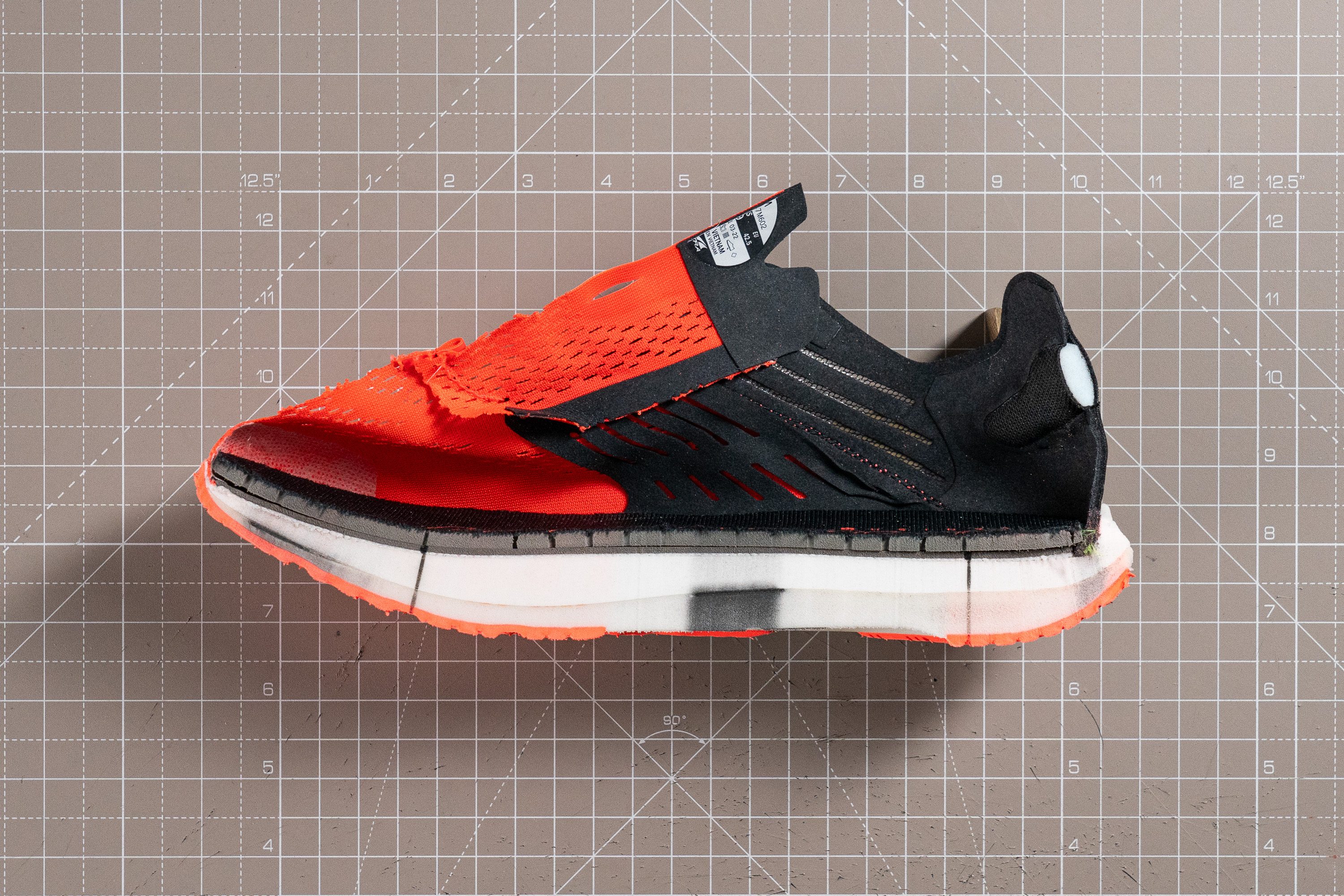
This isn't entirely out of the norm as we've found many discrepancies across all running shoe manufacturers as this article explores, but this is quite extreme. We measure according to the World Athletics guidelines here in the lab, with those lines marked on the midsole corresponding with the respective measuring points. It could be that Altra measures the forefoot stack from where the toe-rocker angle begins which would seemingly account for the disparity.
| Vanish Carbon | 5.4 mm |
| Average | 8.6 mm |
Midsole softness
The Vanish Carbon's midsole is comprised of two slabs of the brand's high-end Ego Pro foam. Pressing our durometer against the upper layer that sits right below the foot yields a reading of 29.4 HA.
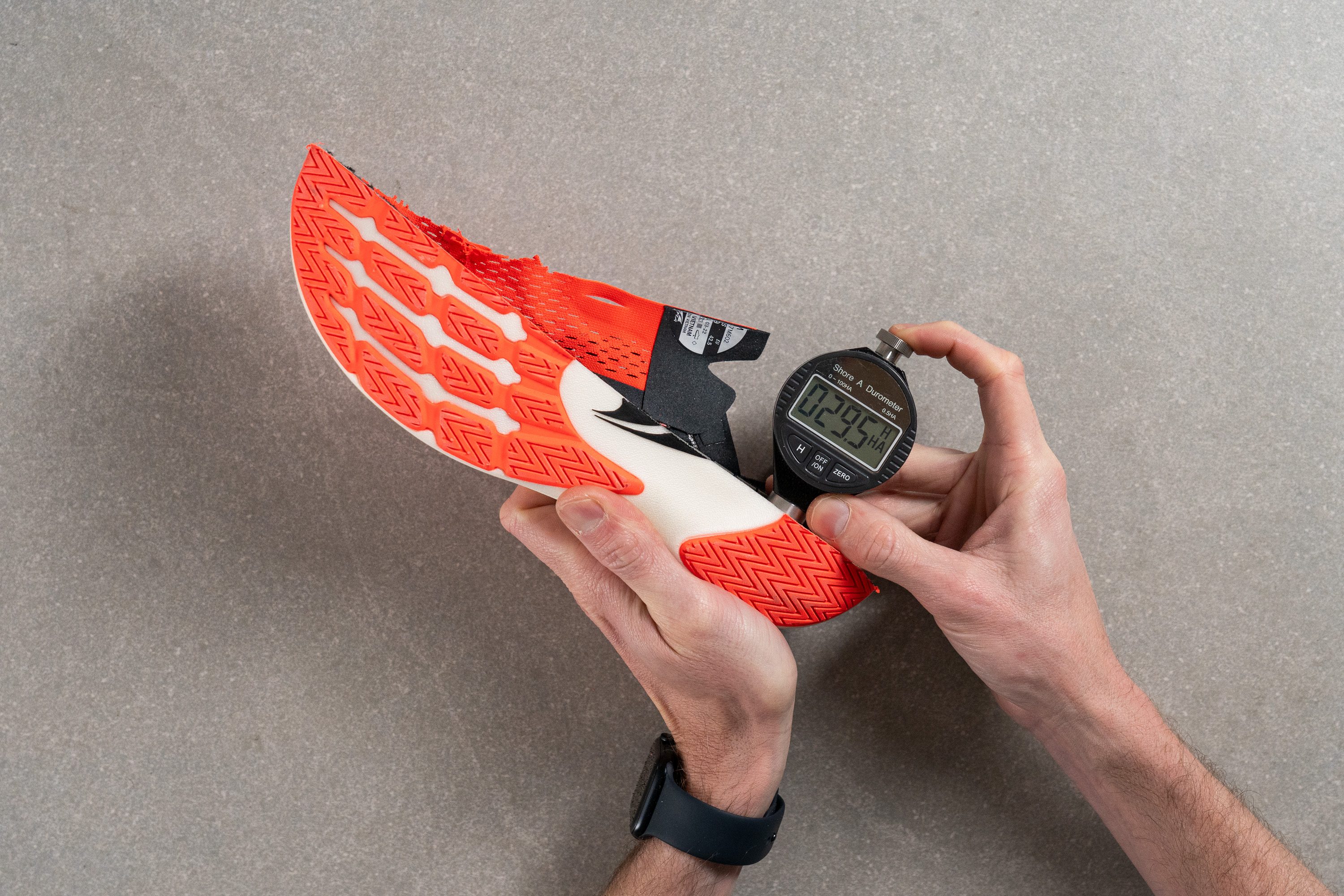
This leaves us with a rather firm footbed that doesn't relent much during our landings, especially when we move at slower paces. However, whenever we relent to this speed demon of a shoe's wishes and push the pace, the pressure of harder impacts on the asphalt seems to soften up the midsole which makes it quite forgiving on the foot, even when pushing the mile markers.
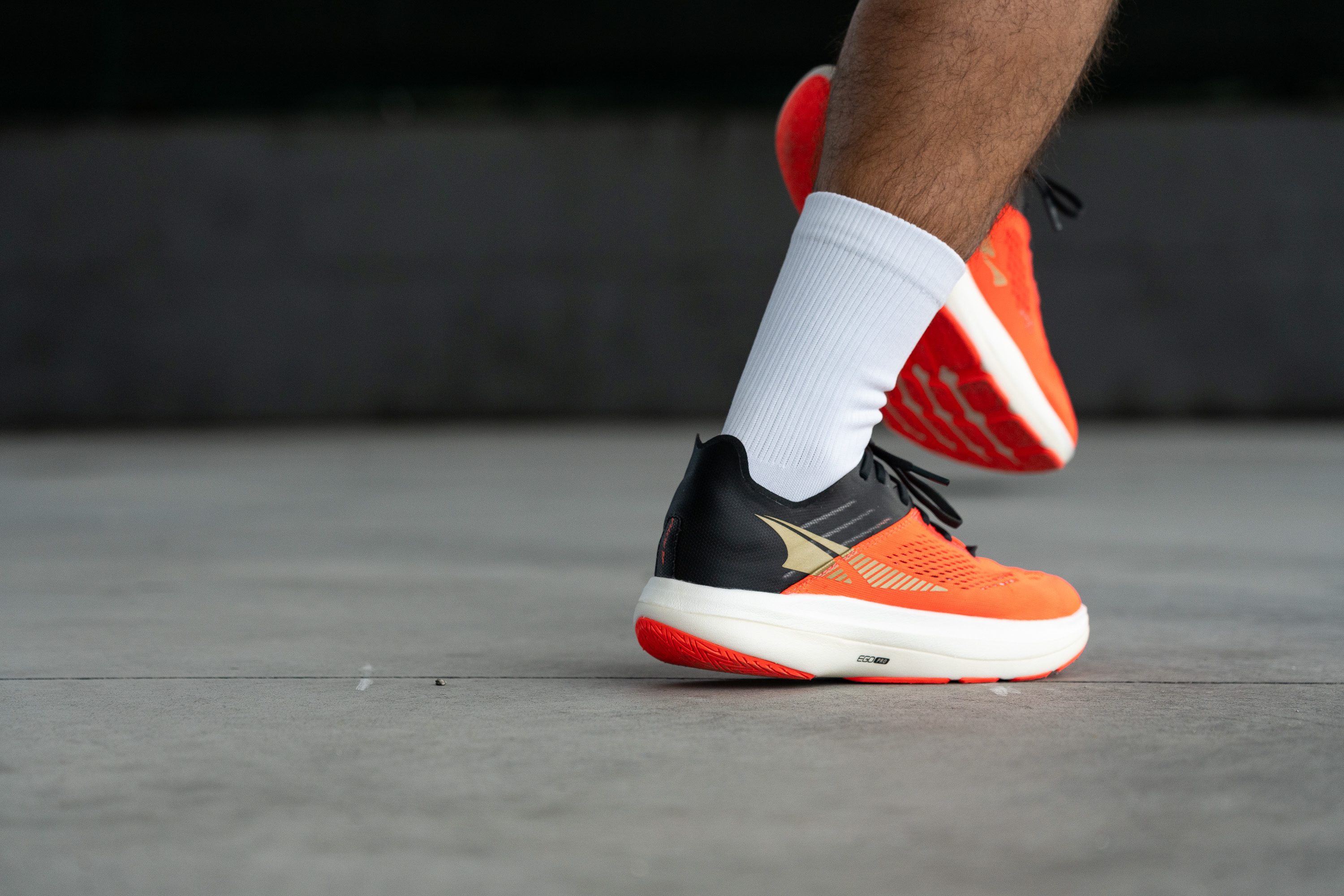
For runners who prefer a low-drop shoe with a more plush and responsive ride for race day, we recommend the ASICS Metaspeed Sky+ instead.
| Vanish Carbon | 29.4 HA |
| Average | 20.4 HA |
Secondary foam
The lower portion of foam that's closer to the ground yields an even firmer durometer reading of 34.3 HA. This explains the brackish first impression we had when putting on the shoe.
However, as previously mentioned, this doesn't tell the full story as the Vanish Carbon's midsole really shines at high speeds. Working in tandem with the carbon plate, it gives our toe-offs a little extra kick that feels energetic without feeling overly bouncy or unnatural. As such, we were able to maintain high-paced even splits quite efficiently while testing the shoe.
| Vanish Carbon | 34.3 HA |
| Average | 22.7 HA |
Rocker
As mentioned above, the Vanish Carbon boasts a rather pronounced toe rocker wherein the midsole curves upwards quite dramatically from the forefoot to the toes.
This promotes smooth, rolling transitions from midfoot to forefoot for quicker and more efficient toe-offs which not only helps with faster runs but longer ones too. For all you need to know about rockered running shoes, check out this handy guide.
Size and fit
Size
Altra Vanish Carbon fits slightly small (20 votes).
Internal length
| Vanish Carbon | 265.8 mm |
| Average | 269.4 mm |
Toebox width - widest part
Using our caliper to measure the toebox at its widest point, we found the Vanish Carbon to be on par with our current lab average at 97.1 mm wide.
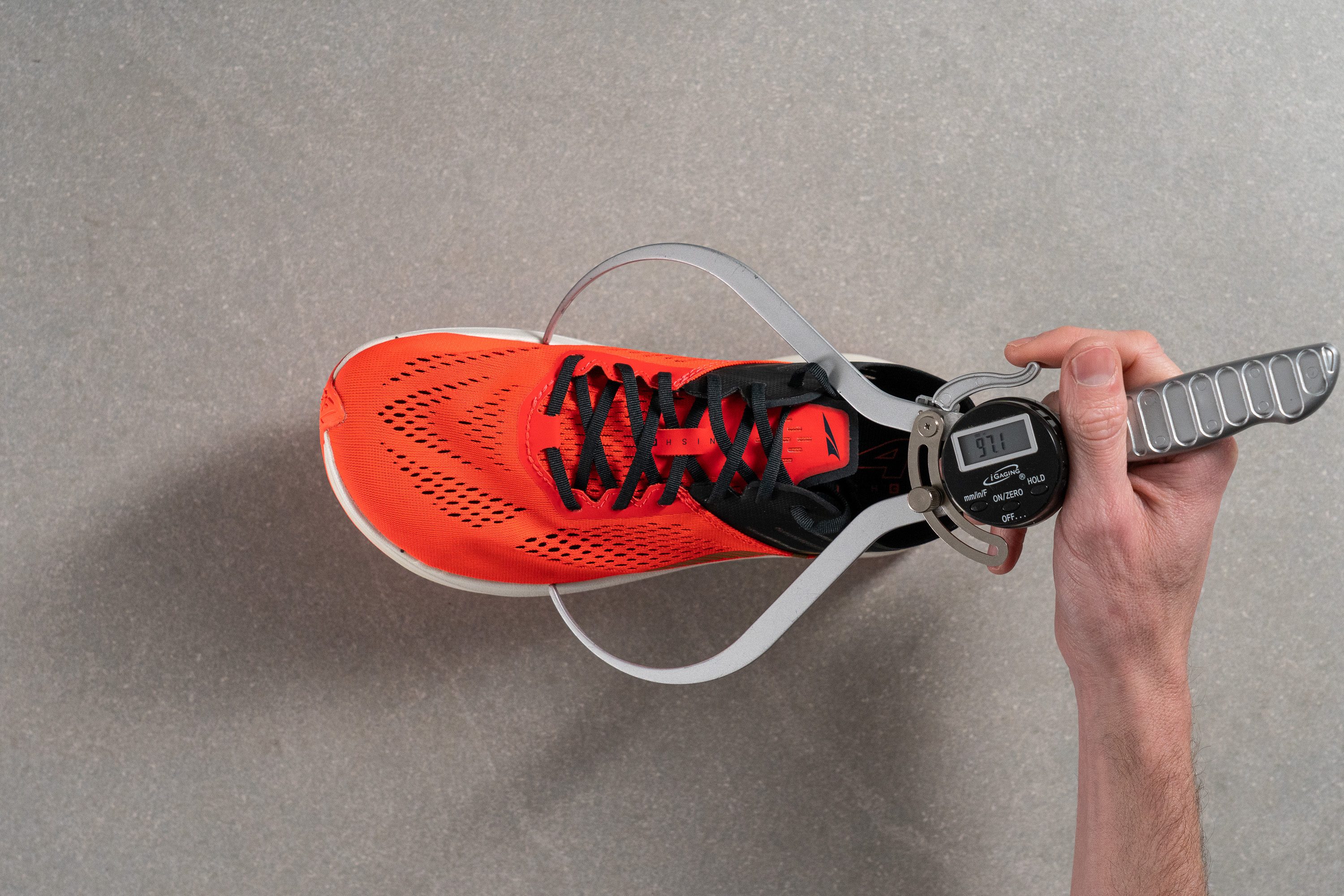
While not as roomy as other Altra toeboxes, this is much less constrictive than race-ready shoes notoriously tend to be, with the Nike Vaporfly 3 as a case in point. This will feel quite comfortable for those with narrow to medium-width feet, but should also provide a nice and snug fit for broad-footed runners as well.
This test follows an older methodology, which is why you don't see recently tested shoes in the chart. Results from different methodologies can not be compared.
| Vanish Carbon | 97.1 mm |
| Average | 98.5 mm |
Toebox width - big toe
Measuring the toebox up in the area around the big toe, we found that it's significantly wider than average at 84.2 mm wide.
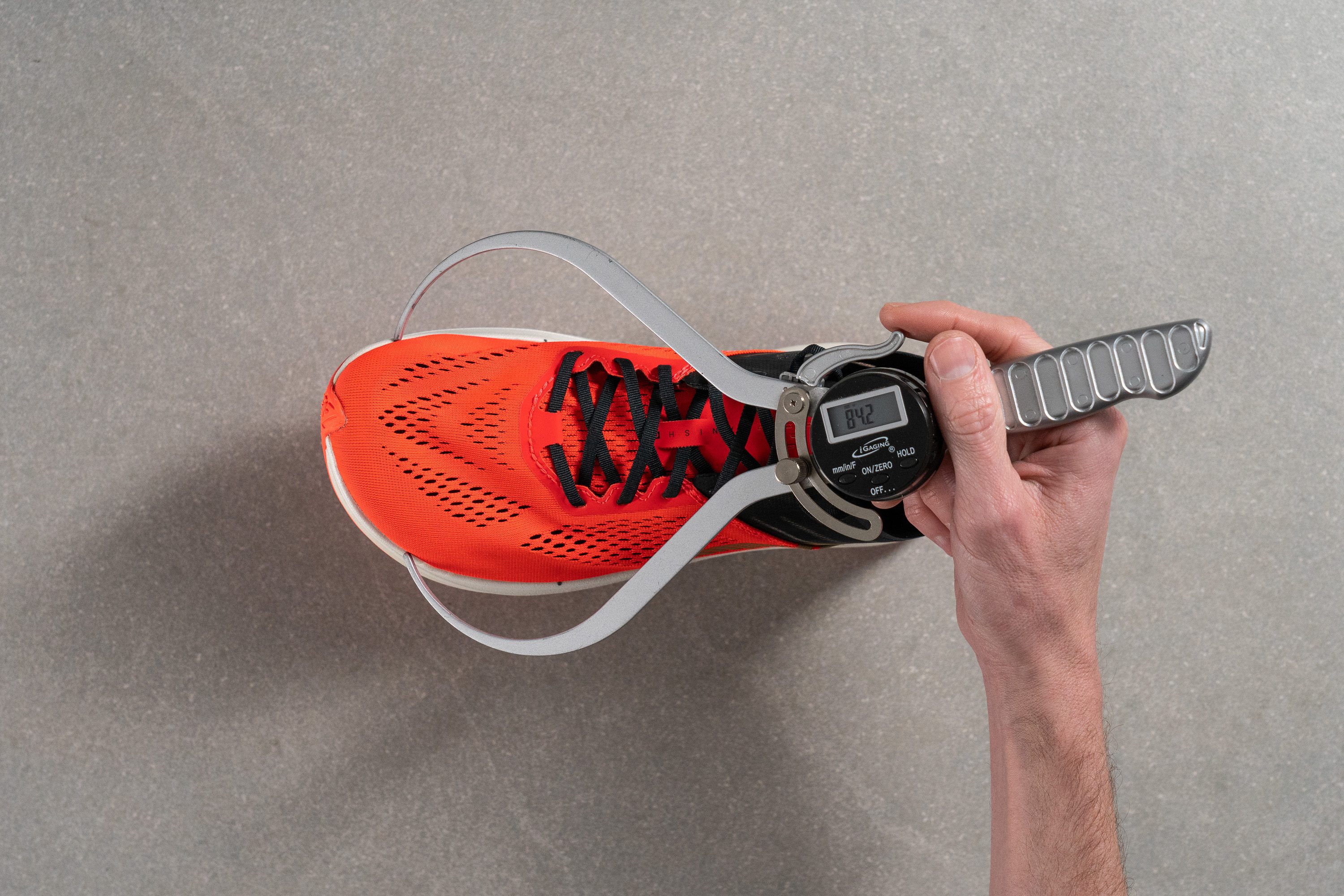
In this way, the Vanish Carbon resembles other Altra models with its foot-shaped silhouette that allows our toes to splay out unfettered while running in this shoe.
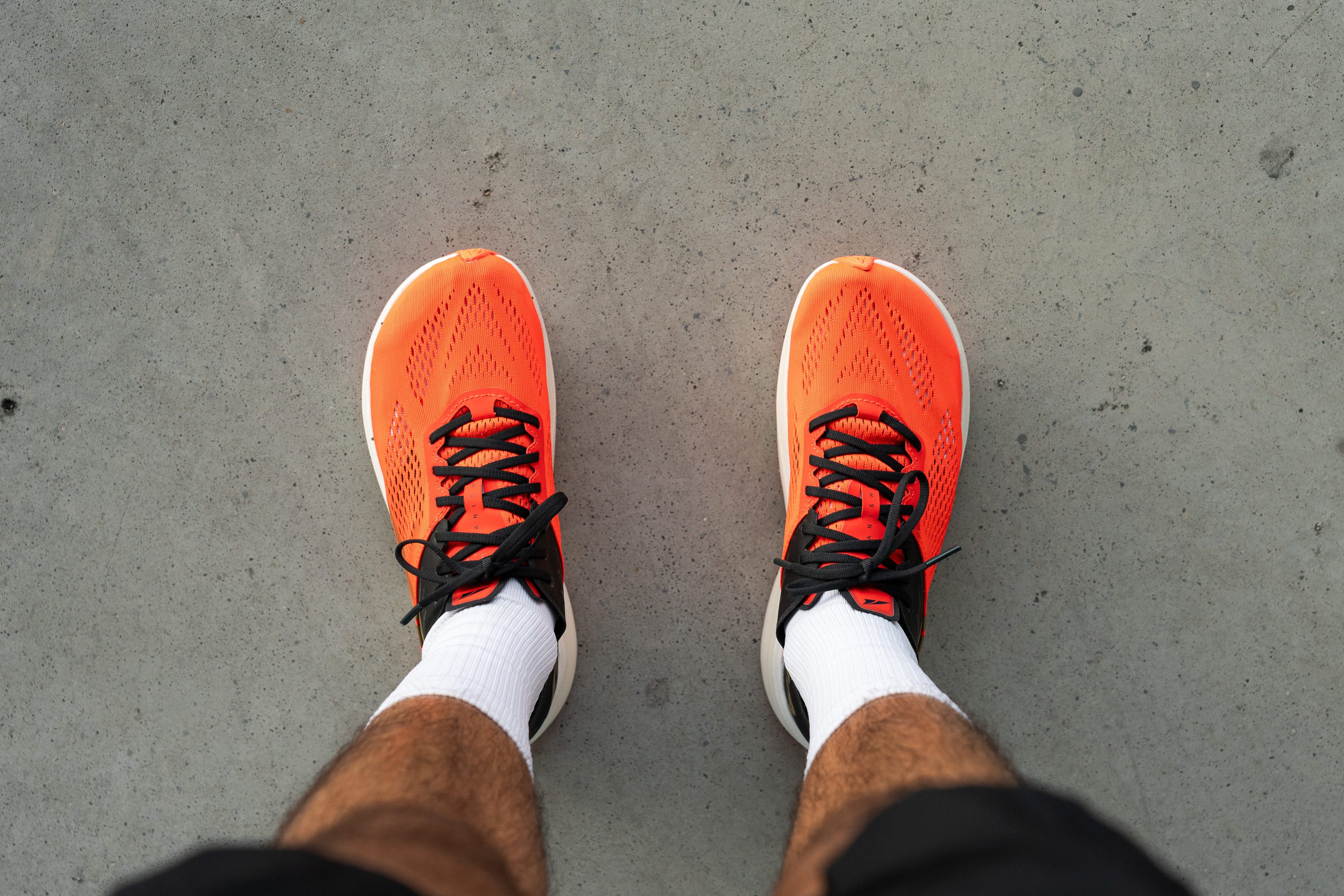
This test follows an older methodology, which is why you don't see recently tested shoes in the chart. Results from different methodologies can not be compared.
| Vanish Carbon | 84.2 mm |
| Average | 78.4 mm |
Flexibility / Stiffness
We secured the Vanish Carbo to our workbench and found that 45.5N of force is needed to bend the shoe 90 degrees. This is certainly stiffer than the average running shoe, but relatively pliable compared to other carbon-plated shoes like the Nike Vaporfly 3 (56.1N) and the Saucony Endorphin Elite (64.5N).
This is a result of the shoe only utilizing a half-plate at the forefoot rather than one that runs the entire length of the shoe. During testing, this gave our toe-offs the little extra oomph needed to keep us shifting along at high speeds.
This test follows an older methodology, which is why you don't see recently tested shoes in the chart. Results from different methodologies can not be compared.
| Vanish Carbon | 45.0N |
| Average | 28.1N |
Stiffness in cold (%)
Becoming 41.6% stiffer post-freezer, the Vanish Carbon stiffens up at about the same rate as the average road shoe. However, with 63.6N of force needed to bend the cold shoe, it's certainly going be more difficult to bend and less forgiving on the foot during winter races.
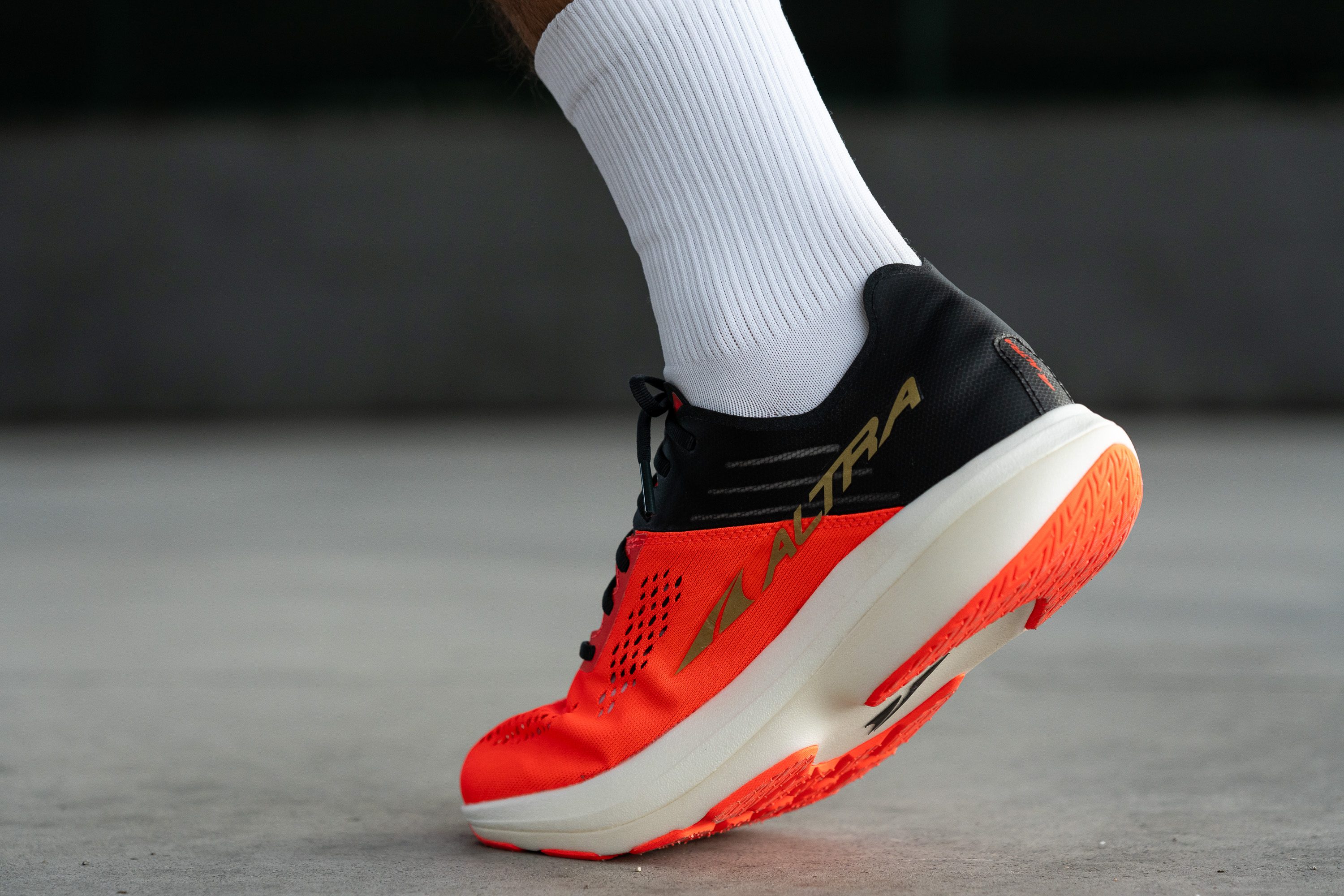
| Vanish Carbon | 42% |
| Average | 33% |
Weight
Tipping our scale at a lean 7.8 oz (221g), the Vanish Carbon is significantly lighter than the average road shoe. As such, the shoe sits comfortably on our foot during test runs without feeling too cumbersome as we speedily gobble up the mile markers.
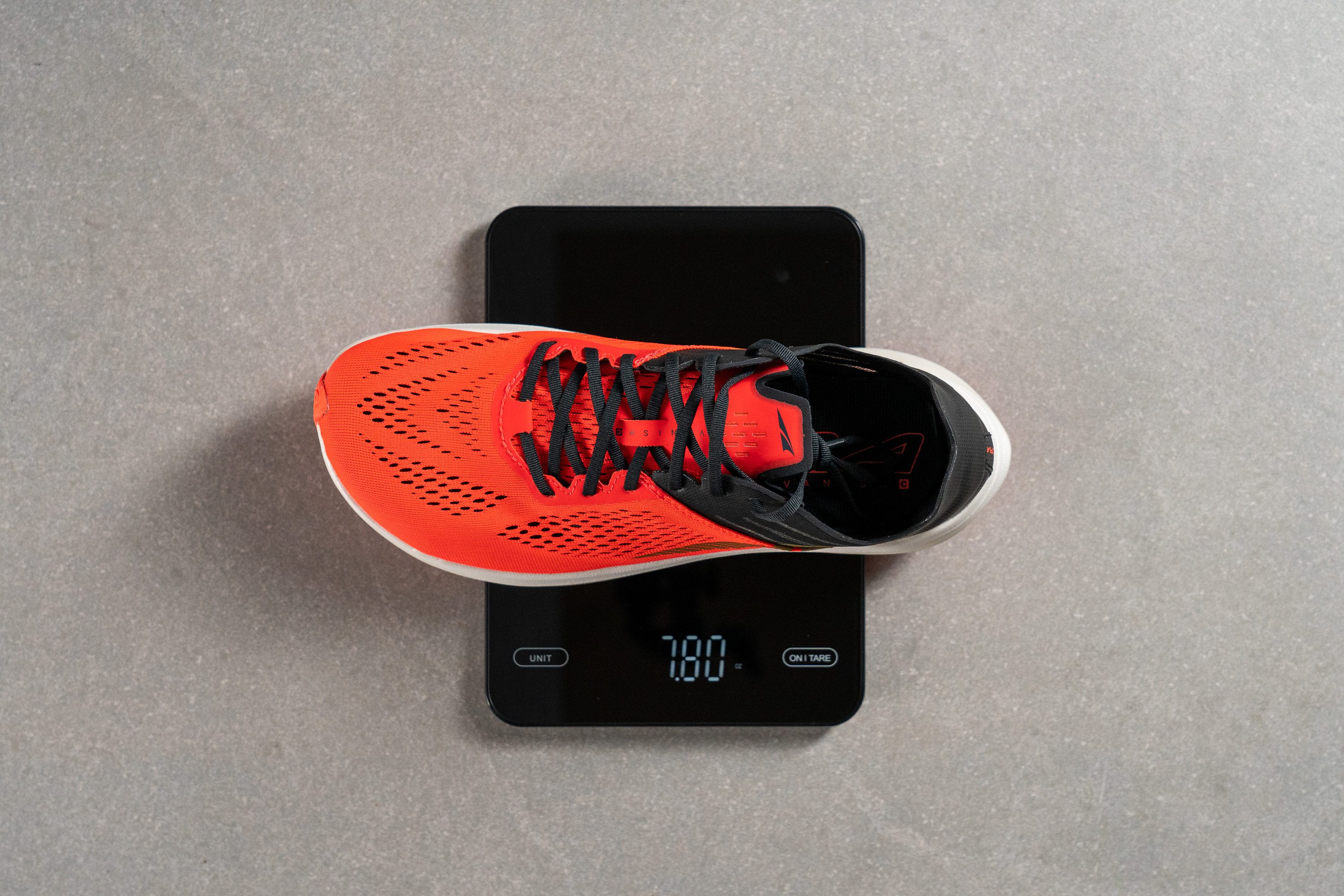
However, in the realm of super shoes, this is a less-than-super weigh-in. There are significantly lighter alternatives like the Saucony Endorphin Elite (7.2 oz/203g) which boasts much more foam underfoot, or the similarly priced but astonishingly featherlight Nike ZoomX Streakfly (6.03 oz/171g).
| Vanish Carbon | 7.8 oz (221g) |
| Average | 9.3 oz (264g) |
Breathability
With its upper looking more porous than a cartoon Swiss cheese, it should come as no surprise that the Vanish Carbon breezed through our smoke test. The smoke escapes the shoe almost as quickly as it's pumped in, thus earning the Vanish Carbon an inevitable 5 out of 5 for breathability.
Inspecting a backlit cross-section of the upper, it lives up to the shoe's name by virtually vanishing and allowing the light to shine brightly through the mesh. Even the more solid lateral overlay features viable vents for airflow. As such, the shoe will feel extremely breezy during warmer summer races, and shouldn't develop a bad smell over time.
As we can see from our microscope shots of the Vanish Carbon's mesh, the braided fibres themselves have lots of gaps to promote airflow and open up to form a pattern of perforations throughout the toebox.
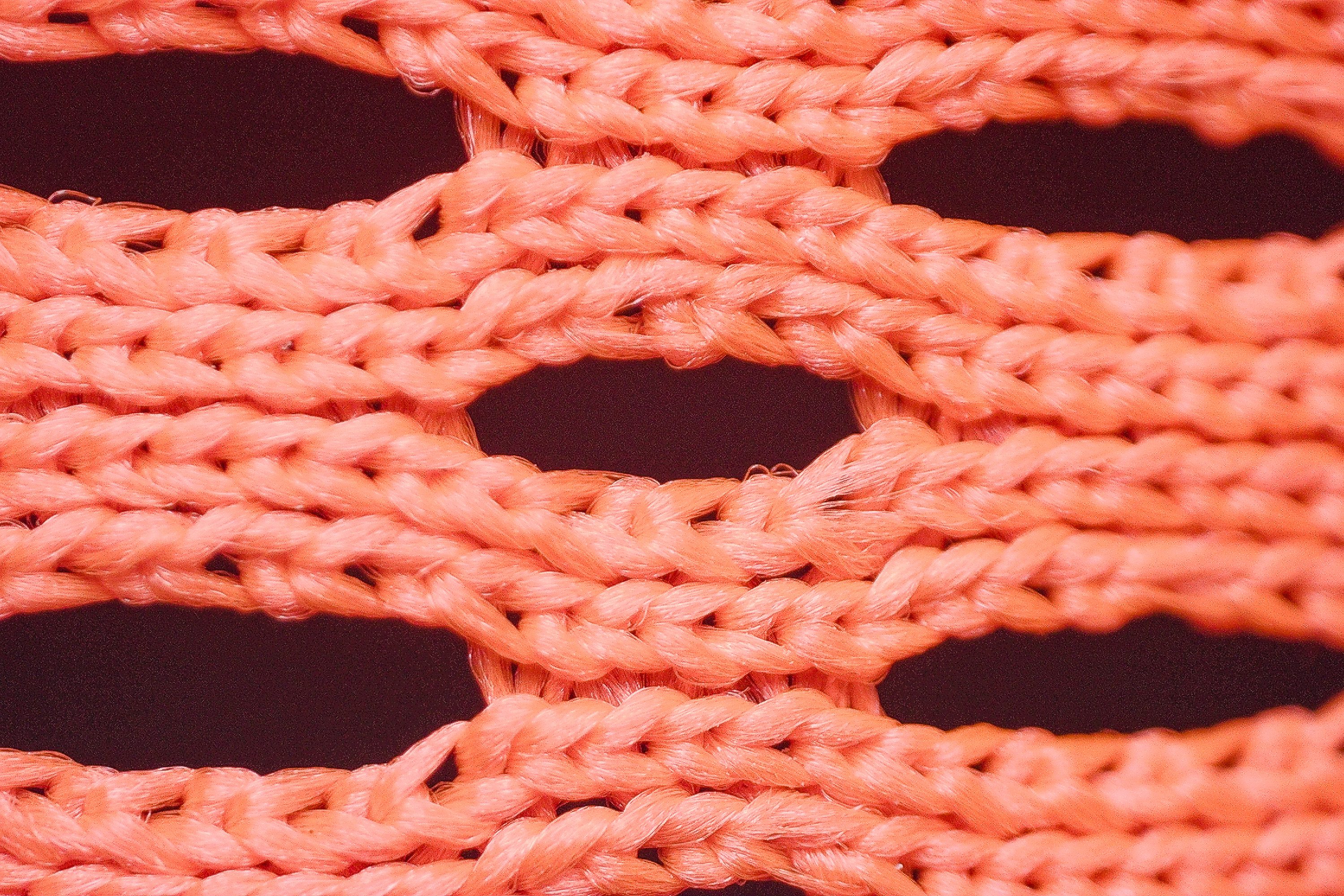
| Vanish Carbon | 5 |
| Average | 3.7 |
Stability
Lateral stability test
While the shoe does very little to limit our lateral movements at the ankle or heel, the Vanish Carbon's base remains very well-planted as we shift our weight from side to side.
Torsional rigidity
We could barely get the Vanish Carbon to budge as we attempted to bend and twist the shoe in our hands, earning it the highest torsional rigidity score of 5 out of 5 on our subjective scale.
This isn't out of the ordinary for shoes with stiff carbon plates, with this feature mitigating how much our foot is able to contort upon impact. This leaves us with a level base that allows for stable landings and toe-offs, thus allowing us to focus on pushing the pace rather than correcting our balance while sprinting in this shoe.
| Vanish Carbon | 5 |
| Average | 3.5 |
Heel counter stiffness
The Vanish Carbon's heel counter, on the other hand, is extremely pliable and offered no resistance to our manual manipulations, earning it the lowest stiffness score of 1 out of 5.
As such, the shoe provides a rearfoot lockdown that feels quite secure yet naturally wraps around our heel and tendons while being flexible enough to leave them uninhibited.
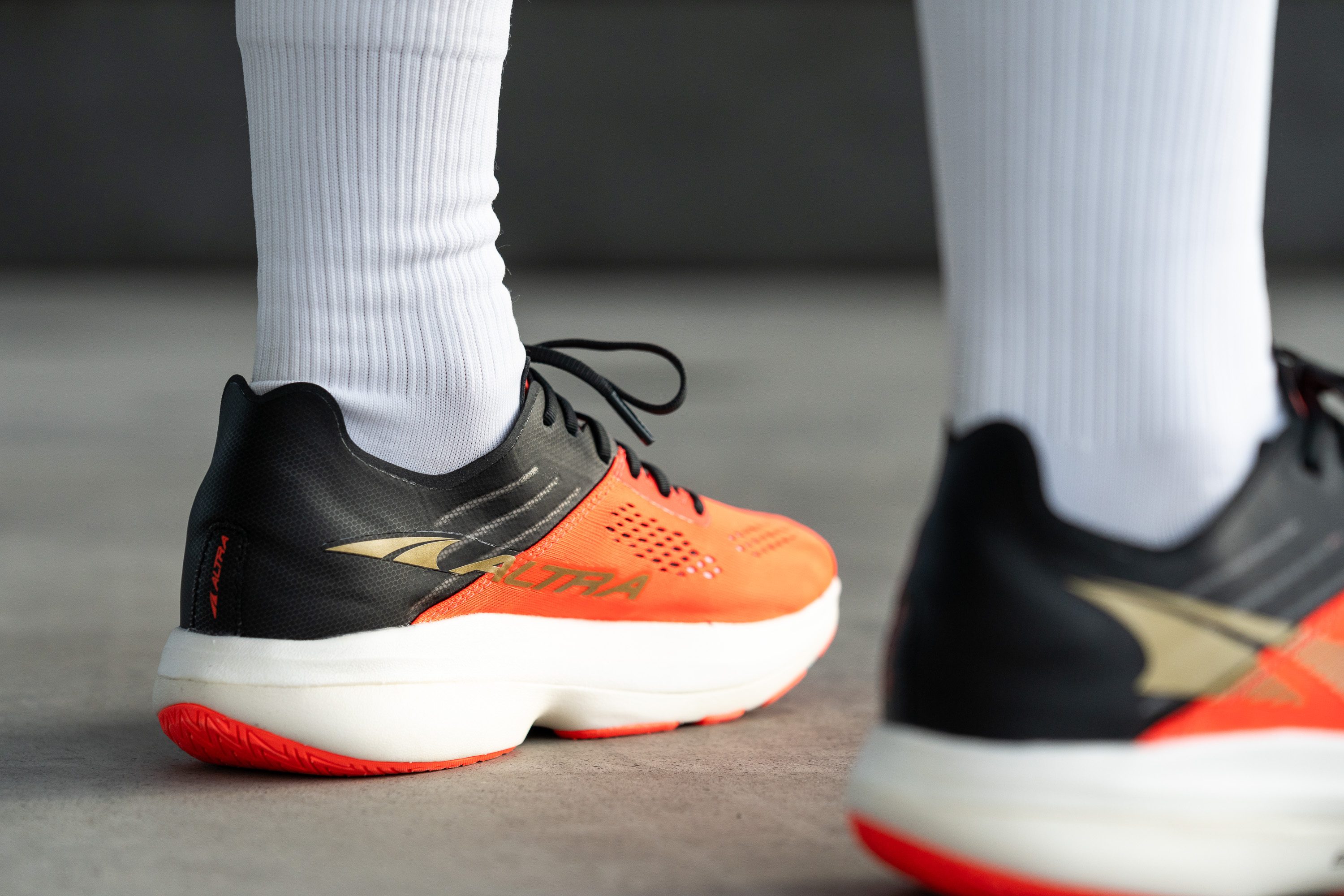
| Vanish Carbon | 1 |
| Average | 2.9 |
Midsole width - forefoot
Using our caliper, we measured the Vanish Carbon's midsole to be 108.8 mm wide at the forefoot. This is narrower than our current lab average but still provides enough of a platform that we enjoyed stable landings and toe-offs while testing the shoe. What's more, this contributes to the shoe's aerodynamic silhouette that feels incredibly nimble on turns.
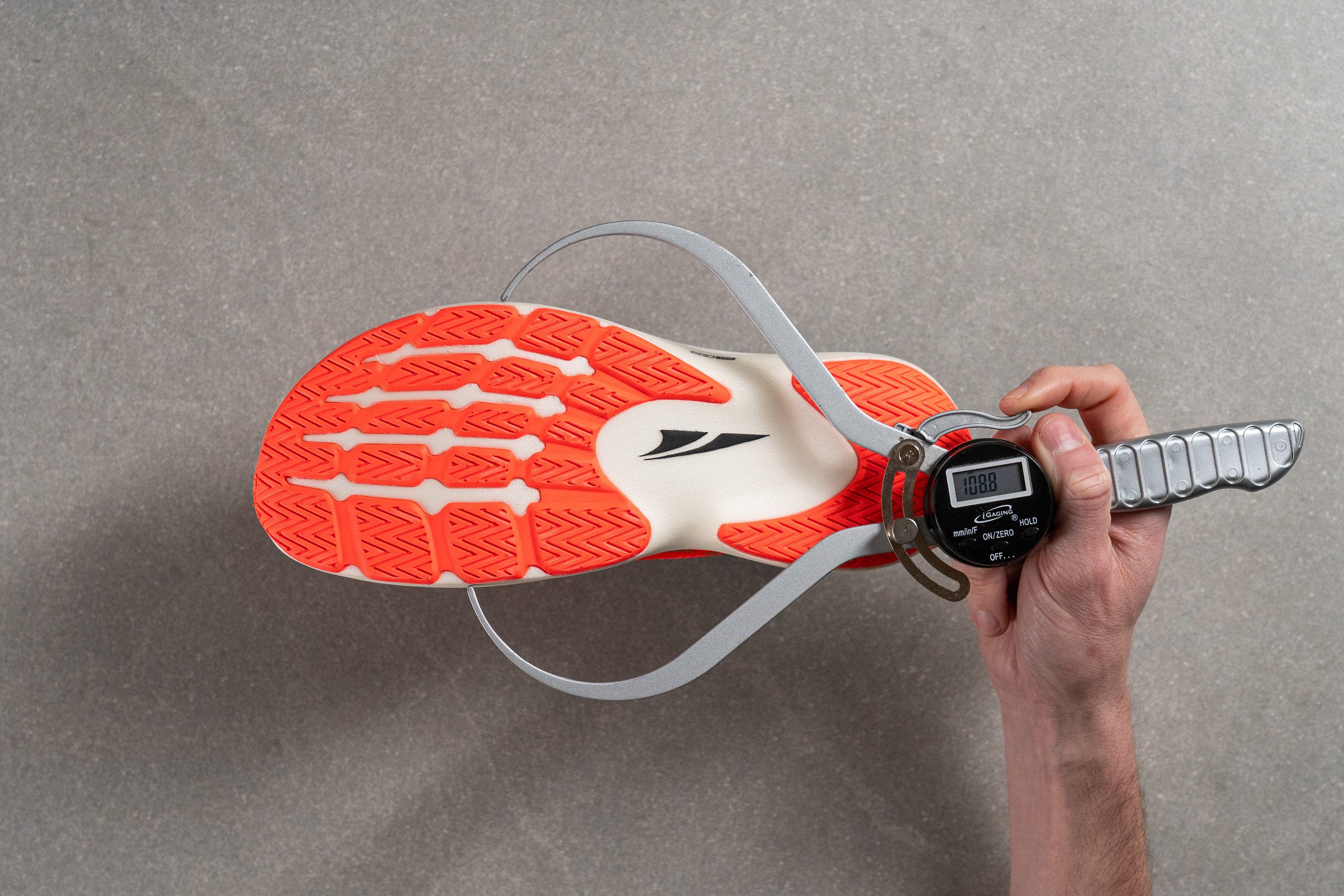
| Vanish Carbon | 108.8 mm |
| Average | 114.4 mm |
Midsole width - heel
The Vanish Carbon's midsole is also narrower than average at the heel which is only 86 mm wide.
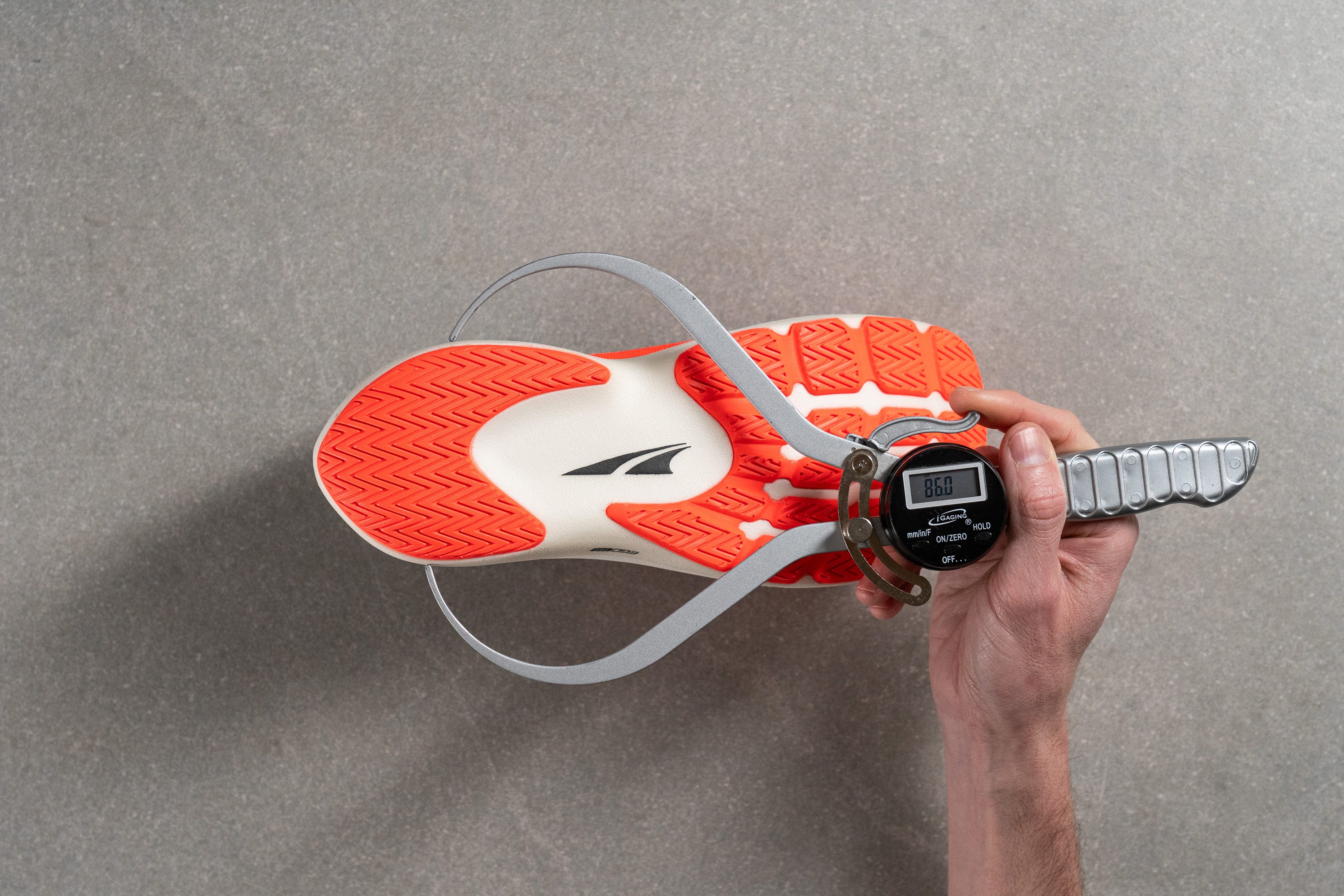
| Vanish Carbon | 86.0 mm |
| Average | 90.6 mm |
Durability
Toebox durability
Unsurprisingly, the Vanish Carbon's superfine mesh stood no chance against our rough-and-ready Dremel which shredded through it within the blink of an eye.
The gaping hole left in the aftermath of the test earns the shoe a 1 out of 5 for toebox durability. Though this isn't out of the ordinary for a performance-oriented shoe where saving on weight is more of a priority than longevity.
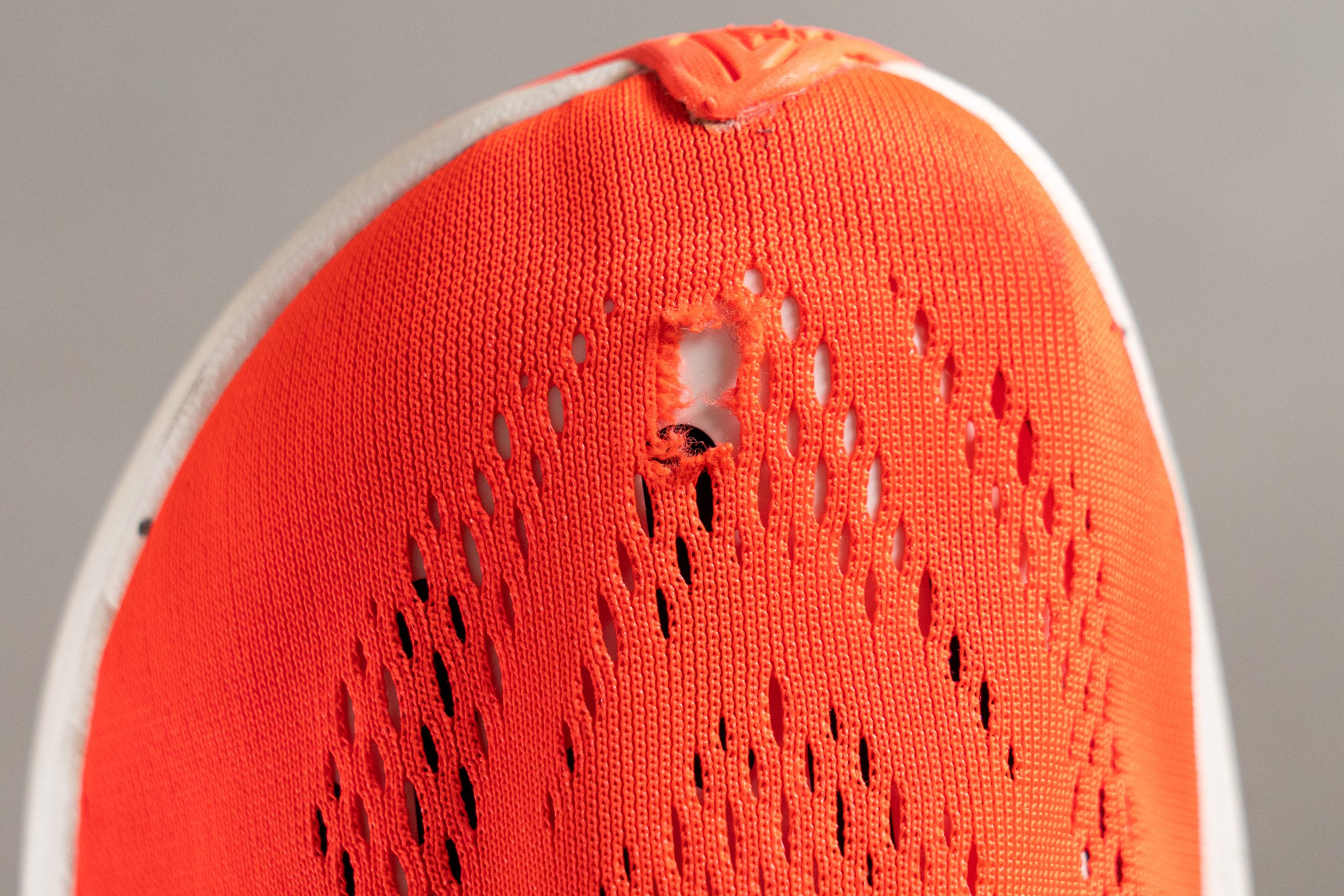
| Vanish Carbon | 1 |
| Average | 2.6 |
Heel padding durability
It's clear that the Vanish Carbon's upper is extremely minimal and has almost no internal padding except for a pillowy strip that runs across the heel.
We pressed our Dremel against the padded part of the heel counter and were pleasantly surprised to find that it's much hardier than the toebox, with our tool's abrasive element sending up some bits of debris but unable to bite into the lining.
After four seconds, the shoe was left with a mere scuff to the heel collar with the padding below remaining intact. This earns the Vanish Carbon a perfect 5 out of 5 on this test which means that the shoe should provide a comfy and secure rearfoot lockdown throughout its lifetime.
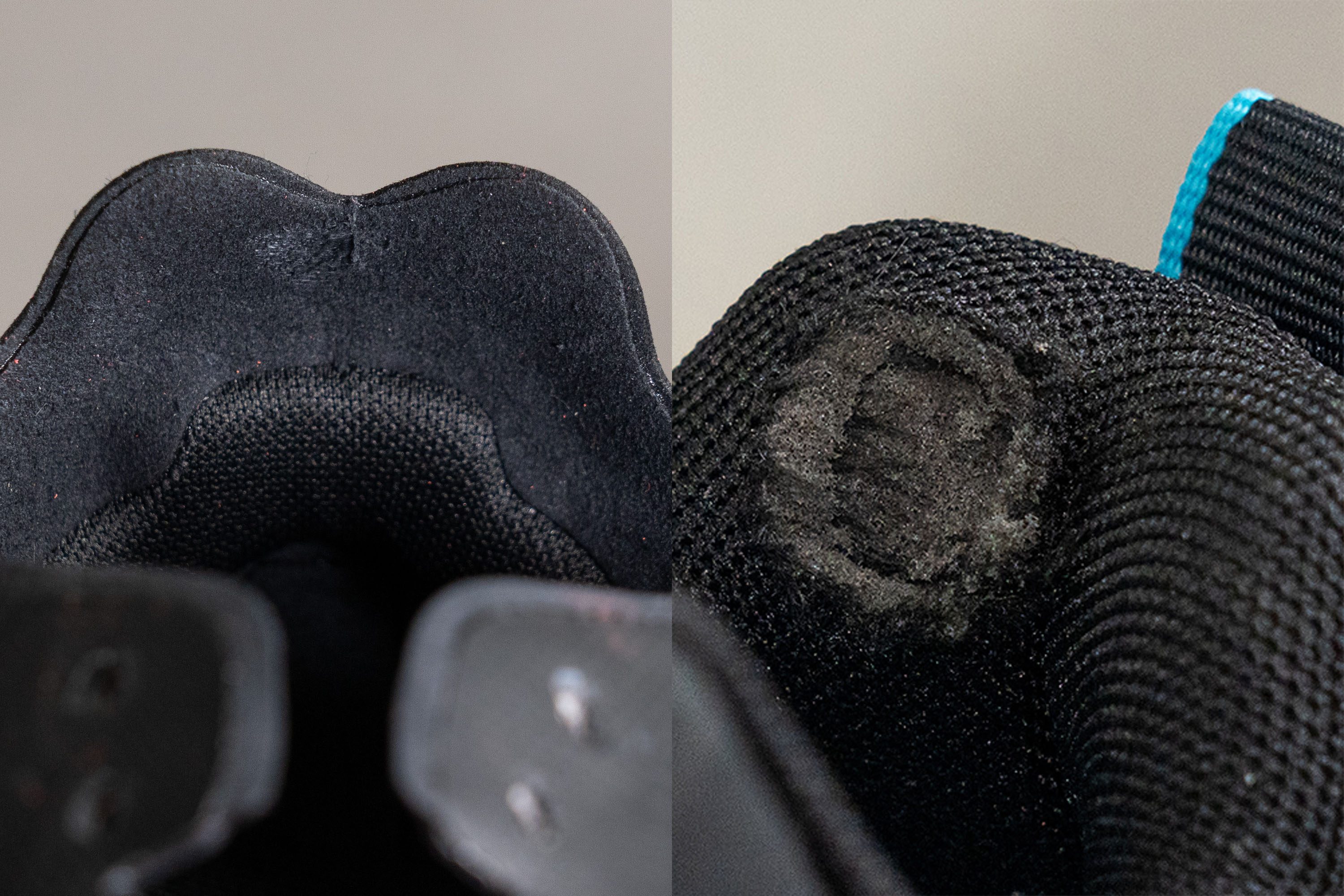
Compare that to the destruction our Dremel inflicted upon the Under Armour Charged Assert 9
| Vanish Carbon | 5 |
| Average | 3.4 |
Outsole hardness
Pressing our durometer against it gives us a slightly higher-than-average reading of 85 HC. However, rather than going with a rubber-based compound, Altra opted for a hardened EVA foam for the Vanish Carbon's outsole. While this is an effective weight-saving measure, we have serious doubts regarding the durability of this material.
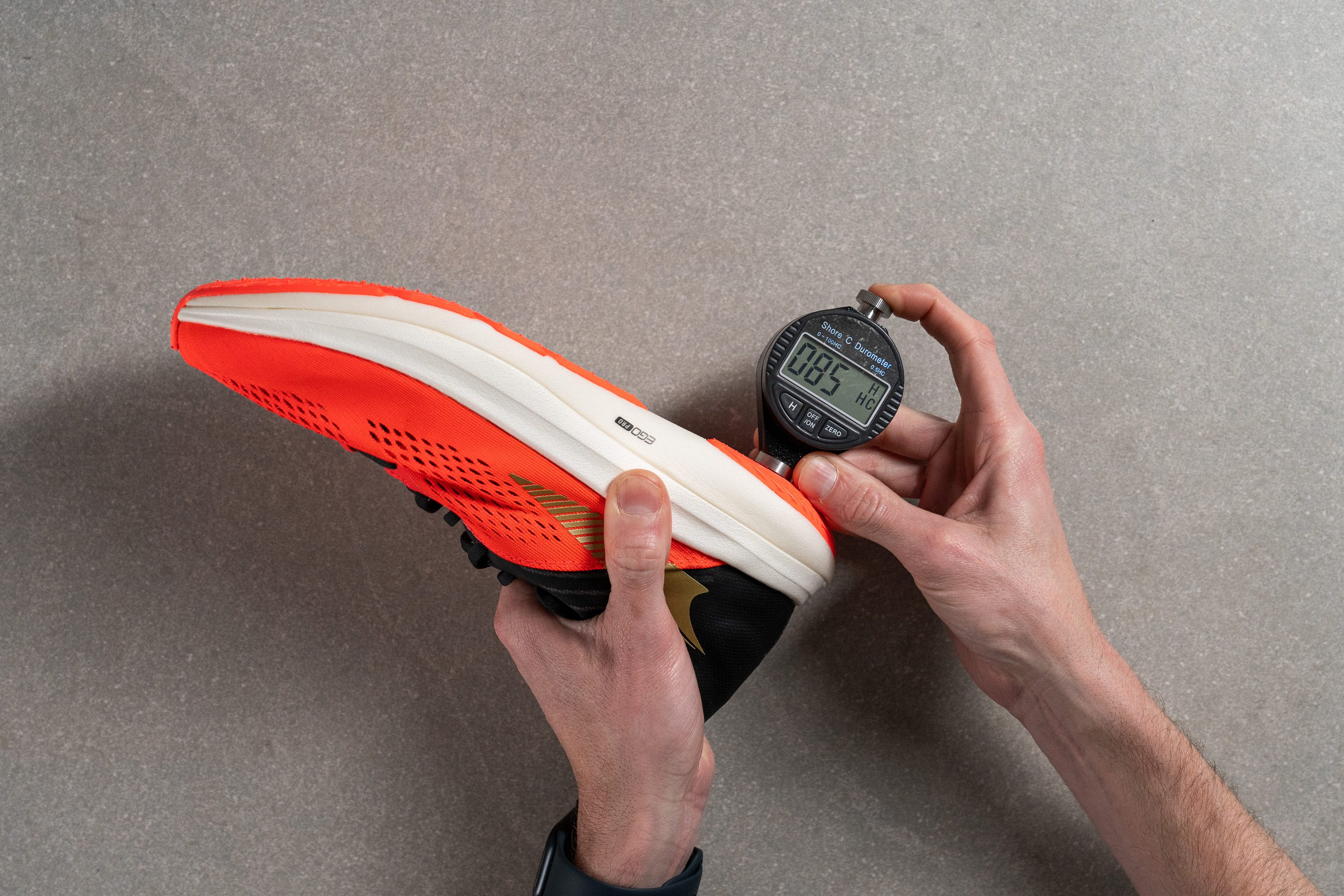
| Vanish Carbon | 85.0 HC |
| Average | 79.2 HC |
Outsole durability
This time spinning at 10K RPM, the Dremel's abrasive element immediately bit into the Vanish Carbon's outsole and kicked up a storm of red foam as it sank in like a hot knife through butter.
Using a tyre tread gauge to assess the destruction our tool had wrought, we found that a whopping 3.2 mm of material was lost during the twenty-two-second test. We can actually see the midsole at the bottom of the crater, making this among the worst performances we've come across in the lab so far. As such, we don't recommend using the Vanish Carbon as a speed trainer too regularly unless attempting to beat a PR or lacing up for race day.
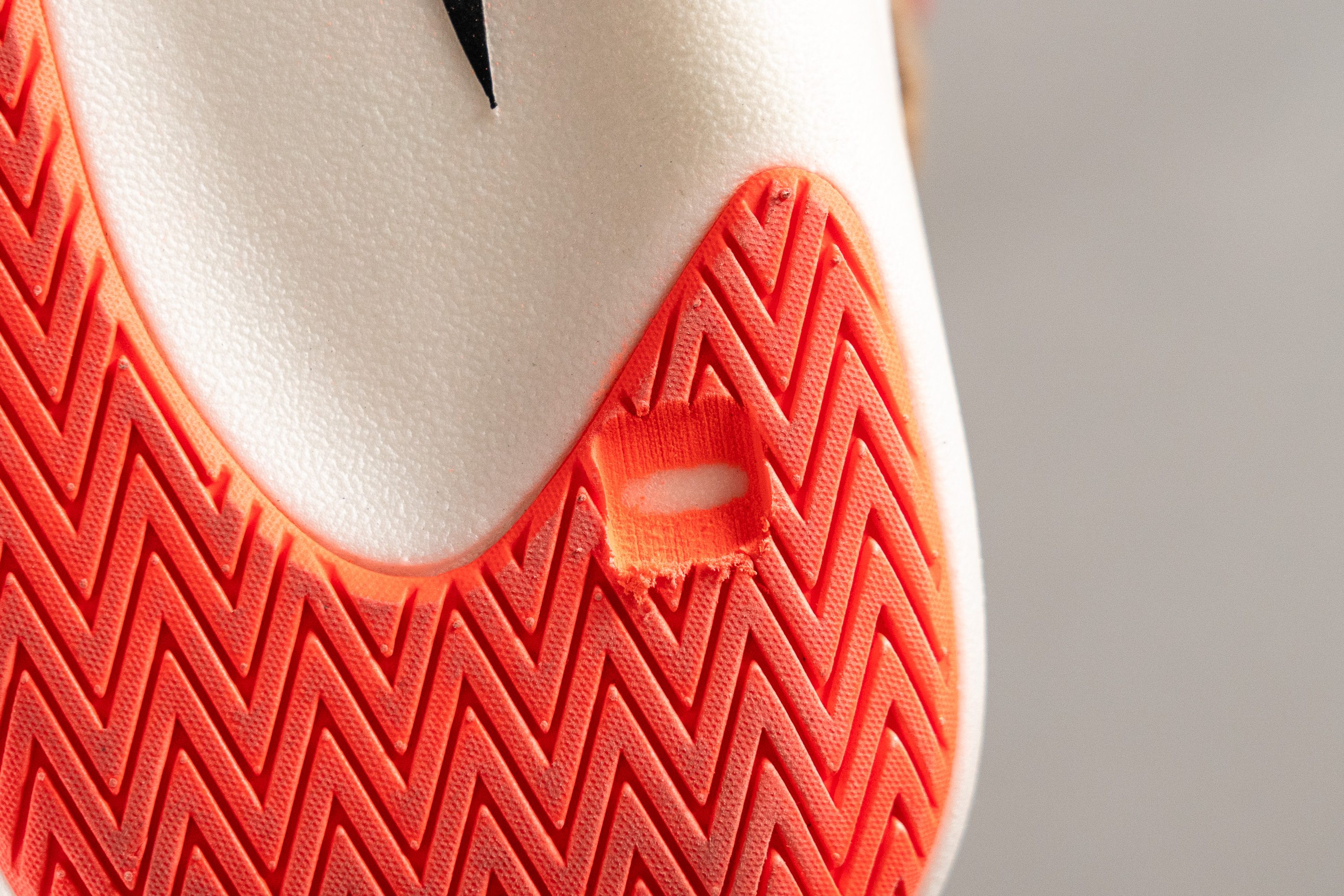
| Vanish Carbon | 3.2 mm |
| Average | 1.1 mm |
Outsole thickness
The Vanish Carbon's outsole is 3.7 mm thick according to our calliper measurements which is right around average. By using the lighter EVA foam material, Altra doesn't need to skimp on material in order to save on weight.
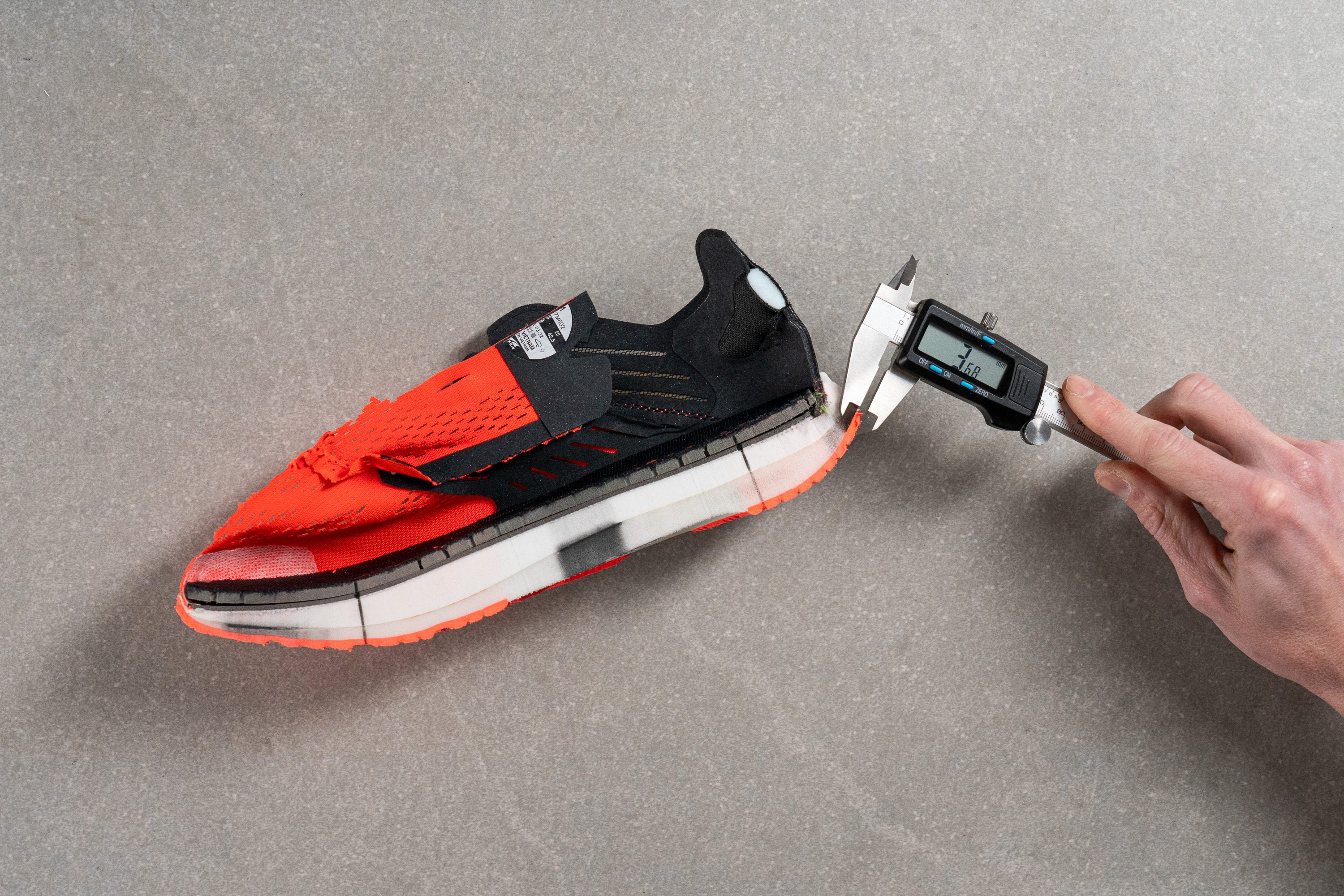
| Vanish Carbon | 3.7 mm |
| Average | 3.2 mm |
Misc
Insole thickness
The Vanish Carbon's insole falls in line with our current lab average and provides an adequately cushy footbed that kept us comfy while testing this shoe.
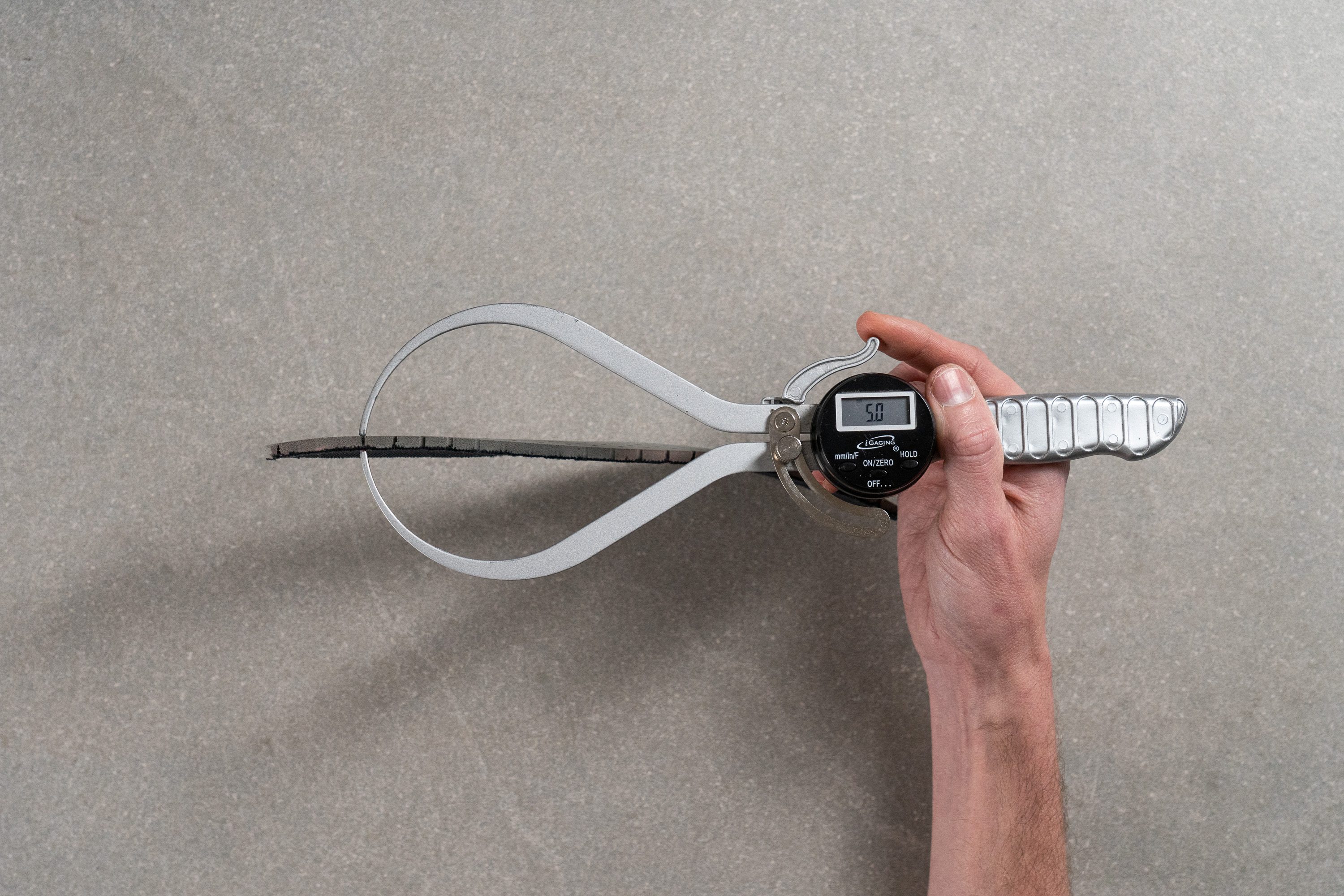
| Vanish Carbon | 5.0 mm |
| Average | 4.5 mm |
Removable insole
The Vanish Carbon's insole isn't glued in, so replacing it with a custom orthotic is possible if extra arch support is required.
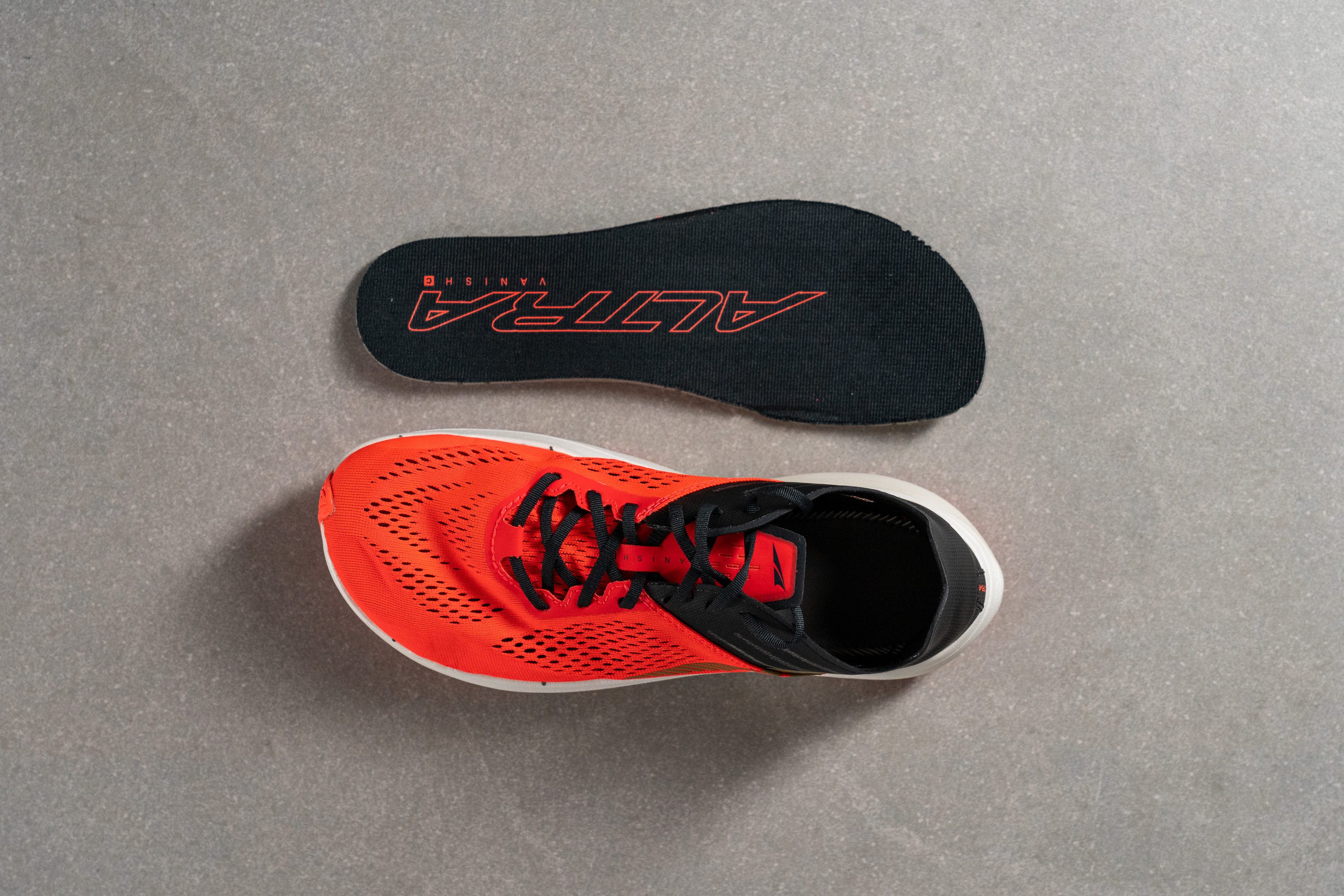
| Vanish Carbon | Yes |
Midsole softness in cold (%)
To measure the effects of cold conditions on its midsole, we placed the Vanish Carbon in the Freezer for twenty minutes. Once nice and chilled, we pressed our durometer into the upper layer of Ego Pro foam once more and found that it only became 10.6% firmer. This is a commendably consistent result which means that the shoe's protective, albeit firm, cushioning won't feel too different as the seasons change. That said, with its airy upper, we do recommend sticking to warm weather races or pairing it with thick socks come wintertime
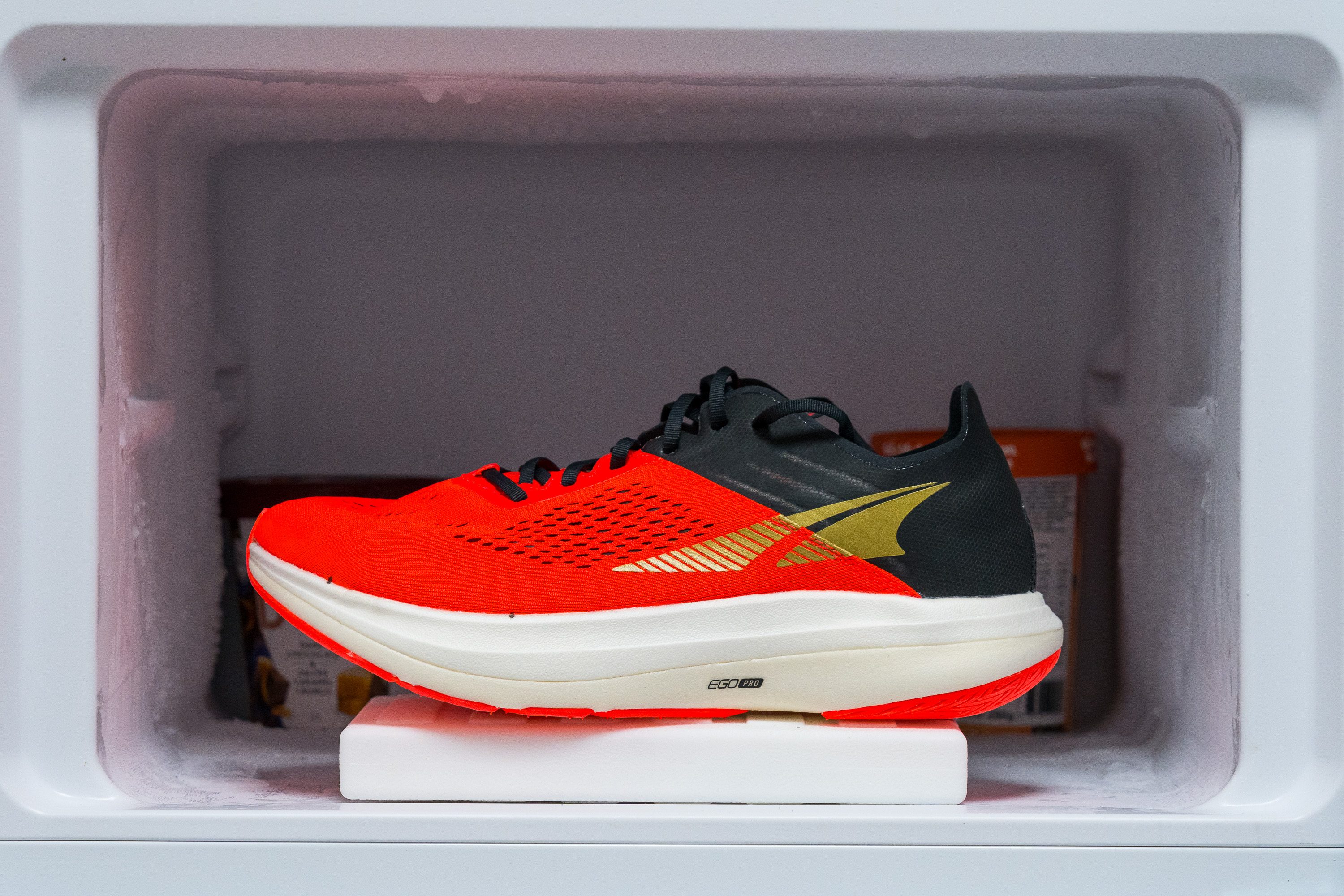
| Vanish Carbon | 11% |
| Average | 24% |
Reflective elements
Performance-oriented shoes usually don't have any unnecessary frills like reflective elements and the Vanish Carbon is no exception.
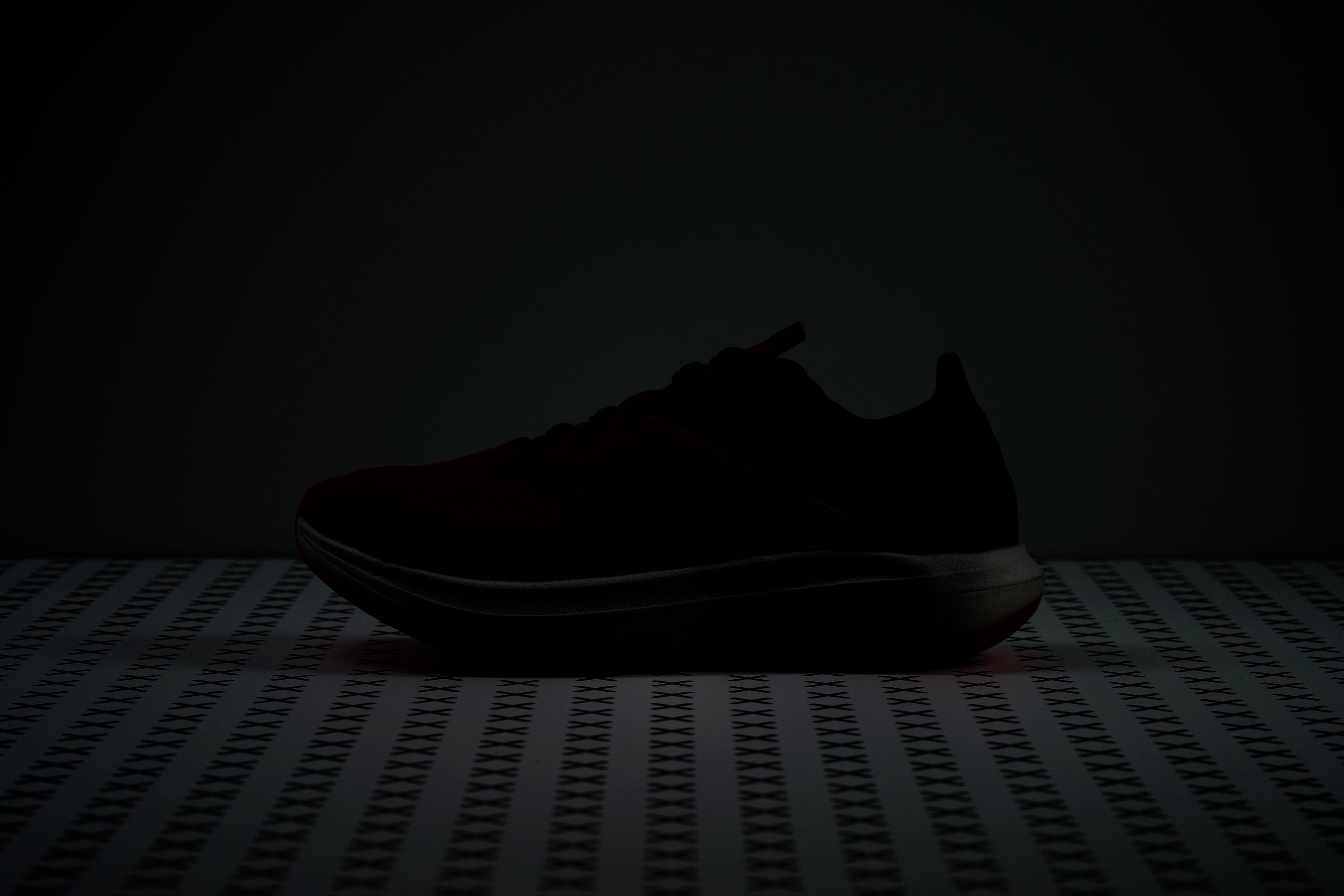
| Vanish Carbon | No |
Tongue padding
Like most race-ready shoes, Altra skimps on padding in the Vanish Carbon's paper-thin tongue which is only 1.7 mm thick.
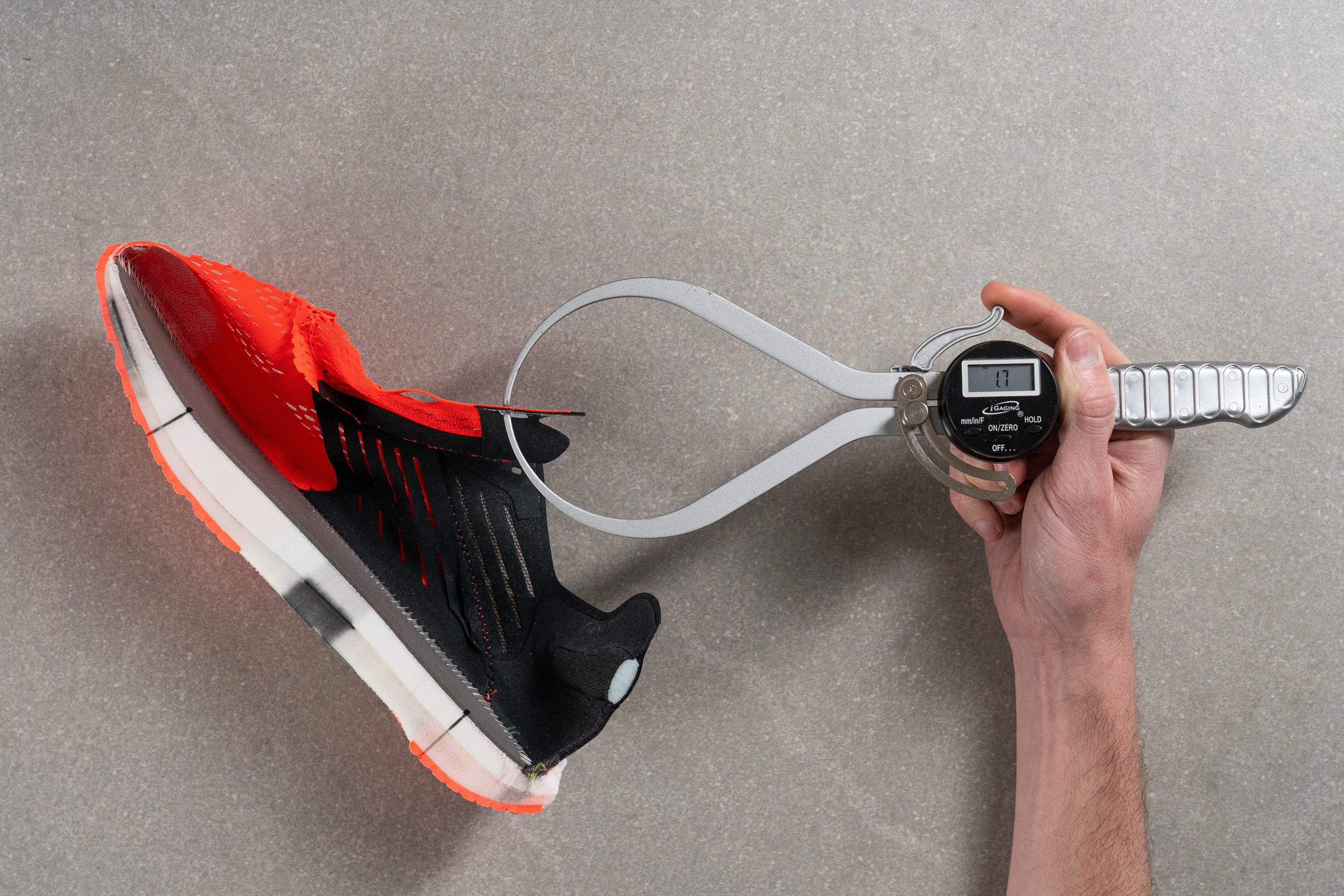
As such, there isn't much material to protect our instep from lace bite, though Altra tries to mitigate this by providing somewhat chunky laces. These turned out to be among our biggest gripes while testing the shoe, especially when going longer distances, as they kept coming undone. Not much chance of smashing a half or full marathon if we have to keep stopping to re-lace along the way.
| Vanish Carbon | 1.7 mm |
| Average | 5.7 mm |
Tongue: gusset type
The Vanish Carbon's tongue is non-gusseted which, combined with the minimal padding, means that is did slip to the side during testing.
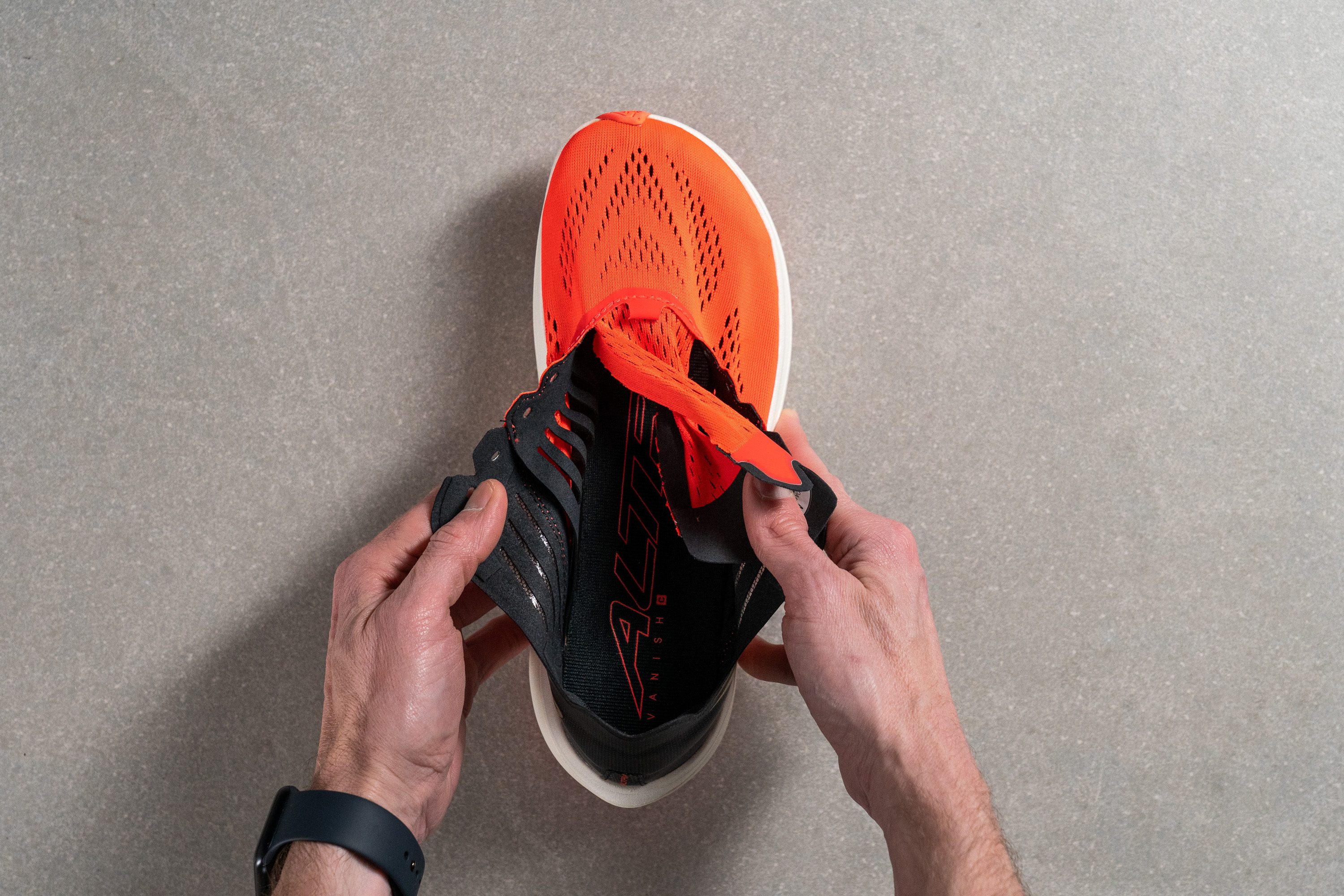
| Vanish Carbon | None |
Heel tab
While there are no loops or tabs to help with the on-and-off, the Vanish Carbon's slightly extended heel collar is helpful when getting the shoe on.
| Vanish Carbon | None |

